Author Biographies 16
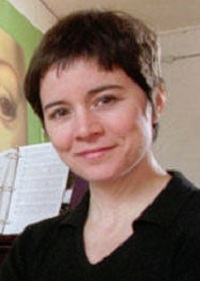 Ann-Marie MacDonald
Ann-Marie MacDonald
1958-
Ann-Marie MacDonald (born October 29, 1958) is a Canadian playwright, novelist, actor and broadcast journalist who lives in Toronto, Ontario. The daughter of a member of Canada’s military, she was born at an air force base near Baden-Baden, West Germany.
MacDonald won the Commonwealth Writers Prize for her first novel, Fall on Your Knees. She received the Governor General’s Award for Literary Merit, the Floyd S. Chalmers Canadian Play Award and the Canadian Author’s Association Award for her play, Goodnight Desdemona (Good Morning Juliet).
She also appeared in the films, I’ve Heard the Mermaids Singing and Better than Chocolate, among others.
Her 2003 novel, The Way the Crow Flies, was partly inspired by the Steven Truscott case.
Source: http://en.wikipedia.org/wiki/Ann-Marie_MacDonald
 Bibliography
Bibliography
Press your browser’s BACK button to return to the previous page.
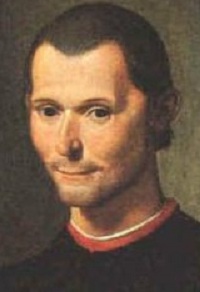 Niccolo Machiavelli
Niccolo Machiavelli
1469-1527
Niccolo di Bernardo dei Machiavelli (May 3, 1469-June 21, 1527) was an Italian historian, philosopher, humanist and writer based in Florence during the Renaissance. A founder of modern political science, he was a diplomat, political philosopher, playwright and civil servant of the Florentine Republic. He also wrote comedies, carnival songs and poetry. His personal correspondence is renowned in the Italian language. He was Secretary to the Second Chancery of the Republic of Florence from 1498 to 1512, when the Medici were out of power. He wrote his masterpiece, The Prince, after the Medici had recovered power and he no longer held a position of responsibility in Florence.
Machiavelli was born in Florence Italy, the first son and third child of attorney Bernardo di Niccolo Machiavelli and his wife, Bartolomea di Stefano Nelli. Machiavelli was taught grammar, rhetoric and Latin and became a magnificent writer.
In 1494, Florence restored the republic – expelling the Medici family, who had ruled Florence for some 60 years. In June 1498, shortly after the execution of Savonarola, Machiavelli, at the age of 29, was elected as head of the second chancery. In July 1498, he was also made the secretary of the Dieci di Liberta e Pace. He was in a diplomatic council responsible for negotiation and military affairs, carrying out, between 1499 and 1512, several diplomatic missions, to the court of Louis XII in France, to that of Ferdinand II of Aragon, in Spain, in Germany and to the Papacy in Rome, in the Italian states. Moreover, from 1502 to 1503, he witnessed the brutal reality of the state-building methods of Cesare Borgia (1475-1507) and his father, Pope Alexander VI, who were then engaged in the process of trying to bring a large part of central Italy under their possession, partly under the pretext of defending Church interests.
Between 1503 and 1506, Machiavelli was responsible for the Florentine militia, including the city’s defense. He distrusted mercenaries, preferring a politically invested citizen-militia – a philosophy that bore fruit. His command of Florentine citizen-soldiers defeated Pisa in 1509; yet, in August 1512, the Medici, helped by Pope Julius II, used Spanish troops to defeat the Florentines at Prato. The Florentine city-state and the Republic were dissolved. Machiavelli was deprived of office in 1512 by the Medici and, in 1513, was accused of conspiracy, arrested and imprisoned for a time. Despite torture, he denied involvement and was released. Then, retiring to his estate at Sant’Andrea in Percussina, near San Casciano in Val di Pesa, he devoted himself to study and writing the political treatises that earned his intellectual place in the development of political philosophy and political conduct.
Machiavelli died in 1527 at the age of 58.
Source: http://en.wikipedia.org/wiki/Niccol%C3%B2_Machiavelli
 Bibliography
Bibliography
Press your browser’s BACK button to return to the previous page.
 Alasdair MacIntyre
Alasdair MacIntyre
1929-
Alasdair Chalmers MacIntyre (January 12, 1929) is a British philosopher primarily known for his contribution to moral and political philosophy but known also for his work in history of philosophy and theology. He is Senior Research Fellow at the Centre for Contemporary Aristotelian Studies in Ethics and Politics (CASEP) at London Metropolitan University and an Emeritus Professor of Philosophy at the University of Notre Dame.
MacIntyre was born in Glasgow to John and Emily (Chalmers) MacIntyre. He was educated at Queen Mary College, London, and earned a Master of Arts from the University of Manchester and from the University of Oxford. He began his teaching career in 1951 at Manchester University. He taught at the University of Leeds, the University of Essex and the University of Oxford in the United Kingdom before moving to the U.S. in around 1969. MacIntyre has been something of an intellectual nomad, having taught at many universities in the U.S.
He has also been a visiting professor at Princeton University and is a former president of the American Philosophical Association. In 2010, he was awarded the Aquinas Medal by the American Catholic Philosophical Association.
From 2000, he was the Rev. John A. O’Brien Senior Research Professor in the Department of Philosophy (emeritus since 2010) at the University of Notre Dame, Indiana. He is also Professor Emeritus at Duke University. In April 2005, he was elected to the American Philosophical Society and, in July 2010, became Senior Research Fellow at London Metropolitan University’s Centre for Contemporary Aristotelian Studies in Ethics and Politics.
Source: http://en.wikipedia.org/wiki/Alasdair_MacIntyre
 Bibliography
Bibliography
Press your browser’s BACK button to return to the previous page.
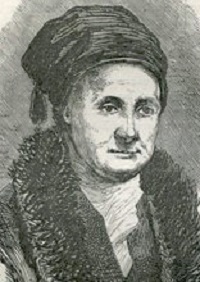 Henry MacKenzie
Henry MacKenzie
1745-1831
Henry MacKenzie (August, 1745-January 14, 1831) was a Scottish novelist and miscellaneous writer. He was born in Edinburgh.
MacKenzie was educated at the Royal High School and the University of Edinburgh, and was then articled to George Inglis of Redhall, who was attorney for the crown in the management of exchequer business. In 1765, he was sent to London to prosecute his legal studies and, on his return to Edinburgh, became partner with Inglis, whom he afterward succeeded as attorney for the crown.
MacKenzie had attempted to interest publishers in what would become his first and most famous work, The Man of Feeling, for several years, but they would not even accept it as a gift. Finally, MacKenzie published it anonymously in 1771 and it became instantly successful. In 1773, he published a second novel, The Man of the World.
The first of his dramatic pieces, The Prince of Tunis, was produced in Edinburgh in 1773 with a certain measure of success. The others were failures. At Edinburgh, MacKenzie belonged to a literary club, at the meetings of which papers in the manner of The Spectator were read. This led to the establishment of a weekly periodical called The Mirror (January 23, 1779-May 27, 1780), of which MacKenzie was editor and chief contributor. It was followed in 1785 by a similar paper, The Lounger, which ran for nearly two years and had the distinction of containing one of the earliest tributes to the genius of Robert Burns.
MacKenzie was an ardent Tory and wrote many tracts intended to counteract the doctrines of the French Revolution. Most of these remained anonymous, but he acknowledged his “Review of the Principal Proceedings of the Parliament of 1784,” a defense of the policy of William Pitt. He was rewarded (1804) by the office of comptroller of the taxes for Scotland.
Some of his literary reminiscences were embodied in his Account of the Life and Writings of John Home, Esq. (1822). He also wrote a Life of Doctor Blacklock, prefixed to the 1793 edition of the poet’s works. In 1807, The Works of Henry MacKenzie were published surreptitiously and he then himself superintended the publication of his Works (1808).
He is buried at Greyfriars Kirkyard, Edinburgh.
Source: http://en.wikipedia.org/wiki/Henry_Mackenzie
 Bibliography
Bibliography
Press your browser’s BACK button to return to the previous page.
 Catharine A. MacKinnon
Catharine A. MacKinnon
1946-
Catharine Alice MacKinnon (born October 7, 1946) is an American feminist, scholar, lawyer, teacher and activist.
MacKinnon was born in Minnesota. Her mother is Elizabeth Valentine Davis; her father, George E. MacKinnon, was a lawyer, congressman (1946 to 1949) and judge on the U.S. Court of Appeals for the D.C. Circuit (1969 to 1995). She also has two younger brothers.
MacKinnon became the third generation of her family to attend her mother’s alma mater, Smith College. She graduated at the top two percent of her class at Smith and moved on to receive her J.D. and Ph.D from Yale University. She was the recipient of a National Science Foundation fellowship while at Yale Law School.
MacKinnon was engaged to Jeffrey Moussaieff Masson for several years during the early 1990s, though the relationship subsequently ended. She has refused to discuss the relationship in later interviews.
MacKinnon is the Elizabeth A. Long Professor of Law at the University of Michigan Law School. In 2007, she served as the Roscoe Pound Visiting Professor of Law at Harvard Law School.
Source: http://en.wikipedia.org/wiki/Catharine_MacKinnon
 Bibliography
Bibliography
Press your browser’s BACK button to return to the previous page.
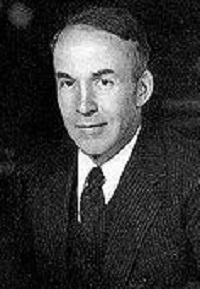 Archibald MacLeish
Archibald MacLeish
1892-1982
Archibald MacLeish (May 7, 1892-April 20, 1982) was an American poet, writer and the Librarian of Congress. He is associated with the Modernist school of poetry. He received three Pulitzer Prizes for his work.
MacLeish was born in Glencoe, Illinois. His father, Andrew MacLeish, worked as a dry goods merchant. His mother, Martha Hillard, was a college professor and had served as president of Rockford College. He grew up on an estate bordering Lake Michigan. He attended the Hotchkiss School from 1907 to 1911 before entering Yale University, where he majored in English, was elected to Phi Beta Kappa and was selected for the Skull and Bones society. He then enrolled in Harvard Law School, where he served as an editor of The Harvard Law Review. In 1916, he married Ada Hitchcock. His studies were interrupted by World War I, in which he served first as an ambulance driver and later as a captain of artillery. He graduated from law school in 1919, taught law for a semester for the government department at Harvard, then worked briefly as an editor for The New Republic. He next spent three years practicing law.
MacLeish greatly admired T.S. Eliot and Ezra Pound, and his work shows quite a bit of their influence. He was the literary figure who played the most important role in freeing Ezra Pound from St. Elisabeth’s Hospital in Washington, D.C., where he was incarcerated for high treason between 1946 and 1958.
MacLeish’s early work was very traditionally Modernist and accepted the contemporary Modernist position that a poet was isolated from society. His most well-known poem, “Ars Poetica,” contains a classic statement of the modernist aesthetic: “A poem should not mean / But be.” He later broke with Modernism’s pure aesthetic. MacLeish himself was greatly involved in public life and came to believe that this was not only an appropriate but an inevitable role for a poet.
Source: http://en.wikipedia.org/wiki/Archibald_MacLeish
 Bibliography
Bibliography
Press your browser’s BACK button to return to the previous page.
 Naguib Mahfouz
Naguib Mahfouz
1911-2006
Naguib Mahfouz (December 11, 1911-August 30, 2006) was an Egyptian writer who won the 1988 Nobel Prize for Literature. He published more than 50 novels, more than 350 short stories, dozens of movie scripts and five plays over a 70-year career.
Born to a lower-middle-class Muslim family in the Gamaleyya quarter of Cairo, Mahfouz left academia and pursued a career in the Ministry of Religious affairs. However, he was soon moved to a role in the Ministry of Culture as the official responsible for the film industry, due to his apparent atheism.
A longtime civil servant, Mahfouz served in the Ministry of Mortmain Endowments, then as Director of Censorship in the Bureau of Art, Director of the Foundation for the Support of the Cinema and finally as a consultant to the Ministry of Culture. He left his post as the Director of Censorship and was appointed Director of the Foundation for the Support of the Cinema. He was a contributing editor for the leading newspaper, Al-Ahram, and in 1969 he became a consultant to the Ministry of Culture, retiring in 1972.
At the time of his death, he was the only Arabic-language writer to have won the Nobel Prize. In July 2006, Mahfouz sustained an injury to his head as a result of a fall. He remained ill until his death on August 30, 2006, in a Cairo hospital.
Source: http://en.wikipedia.org/wiki/Naguib_Mahfouz
 Bibliography
Bibliography
Press your browser’s BACK button to return to the previous page.
 Norman Mailer
Norman Mailer
1923-2007
Norman Kingsley Mailer (January 31, 1923-November 10, 2007) was an American novelist, journalist, essayist, poet, playwright, screenwriter and film director. Mailer wrote more than 40 books. He published 11 novels over a 59-year span.
Mailer is considered an innovator of creative nonfiction, a genre sometimes called New Journalism, which superimposes the style and devices of literary fiction onto fact-based journalism. He was awarded the Pulitzer Prize twice and the National Book Award once. In 1955, Mailer, together with John Wilcock, Ed Fancher and Dan Wolf, first published The Village Voice, which began as an arts and politics-oriented weekly newspaper distributed in Greenwich Village. In 2005, he won the Medal for Distinguished Contribution to American Letters from the National Book Foundation.
Mailer was born to a well-known Jewish family in Long Branch, New Jersey. His father, Isaac Barnett Mailer, was a South African-born accountant, and his mother, Fanny Schneider, ran a housekeeping and nursing agency. Raised in Brooklyn, New York, he graduated from Boys’ High School and entered Harvard University in 1939, where he studied aeronautical engineering. At Harvard, he became interested in writing and published his first story at the age of 18, winning Story magazine’s college contest in 1941.
In 1948, while continuing his studies at the Sorbonne in Paris, Mailer published The Naked and the Dead, based on his military service in World War II.
Barbary Shore (1951) was a surreal parable of Cold War leftist politics set in a Brooklyn rooming-house. His 1955 novel, The Deer Park, drew on his experiences working as a screenwriter in Hollywood in 1949-50. In the tradition of Dickens and Dostoevsky, Mailer wrote his fourth novel, An American Dream, as a serial in Esquire magazine over eight months. In 1980, The Executioner’s Song – Mailer’s novelization of the life and death of murderer Gary Gilmore – won the Pulitzer Prize for fiction. Mailer spent a longer time writing Ancient Evenings – his novel of Egypt in the XX dynasty (about 1100 BC) – than any of his other books, working on it off and on from 1972 until 1983. Harlot’s Ghost, Mailer’s longest novel (1,310 pages), appeared in 1991. It is an exploration of the unspoken dramas of the CIA from the end of WWII to 1965. His final novel, The Castle in the Forest, focused on Hitler’s childhood. The Castle in the Forest was awarded a Bad Sex in Fiction Award by The Literary Review magazine.
In 1992, Mailer received the annual Peggy V. Helmerich Distinguished Author Award presented by the Tulsa Library Trust.
Mailer died of acute renal failure on November 10, 2007, a month after undergoing lung surgery at Mount Sinai Hospital in Manhattan, New York.
Source: http://en.wikipedia.org/wiki/Norman_Mailer
 Bibliography
Bibliography
Press your browser’s BACK button to return to the previous page.
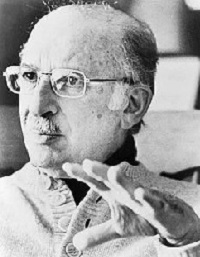 Bernard Malamud
Bernard Malamud
1914-1986
Bernard Malamud (April 26, 1914-March 18, 1986) was an author of novels and short stories. Along with Saul Bellow and Philip Roth, he was one of the great American Jewish authors of the 20th century. His 1966 novel, The Fixer, about antisemitism in Tsarist Russia, won both the National Book Award and the Pulitzer Prize for Fiction.
Bernard Malamud was born in Brooklyn, New York, the son of Max and Bertha (Fidelman) Malamud, Russian Jewish immigrants. A brother, Eugene, was born in 1917. Malamud entered adolescence at the start of the Great Depression. From 1928 to 1932, he attended Erasmus Hall High School in Brooklyn.
Malamud worked for a year at $4.50 a day as a teacher-in-training before attending college on a government loan. He received his B.A. degree from City College of New York in 1936. In 1942, he obtained a master’s degree from Columbia University. He was excused from military service in World War II because he was the sole support of his widowed mother. He first worked for the Bureau of the Census in Washington, D.C., then taught English in New York, mostly high school night classes for adults.
Starting in 1949, Malamud taught four sections of freshman composition each semester at Oregon State University (OSU), an experience fictionalized in his 1961 novel, A New Life. While at OSU, he devoted three days out of every week to his writing and gradually emerged as a major American author. In 1961, he left OSU to teach creative writing at Bennington College, a position he held until retirement. In 1967, he was made a member of the American Academy of Arts and Sciences.
Malamud died in Manhattan in 1986, at the age of 71.
Source: http://en.wikipedia.org/wiki/Bernard_Malamud
 Bibliography
Bibliography
Press your browser’s BACK button to return to the previous page.
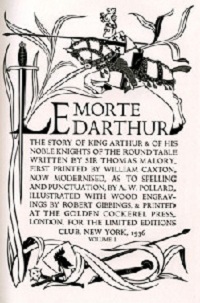 Sir Thomas Malory
Sir Thomas Malory
c. 1414-1471
Born around 1414-1420 into an English gentry family, Sir Thomas Malory spent his first couple of decades in quiet obscurity, aside from campaigning at the Siege of Calais in 1436. By 1441, he had been knighted and had developed a growing interest in politics. In 1445, he became MP for his county and over the next few years developed a startling talent for lawlessness.
In 1444, he had been charged with assault and theft and, in 1450, he tried to ambush and murder the Duke of Buckingham. He allegedly raped Joan Smith not once but twice, stole goods from her husband, extorted money, pilfered cattle and destroyed the Duke of Buckingham’s hunting lodge. In 1451, Malory was imprisoned at Coleshill but escaped two days later by swimming the moat at night. He then twice raided Combe Abbey alongside a band of outlaws, stealing a great deal of money and harassing the monks.
Malory was captured in 1452 and thrown into a London prison, where he spent eight years awaiting trial. After he was bailed out, he was caught stealing horses and placed in a Colchester jail but fought his way through the guards and escaped. He was recaptured and returned to the London prison but was freed by royal pardon in 1460. However, by 1468, Malory was back in Newgate prison, where he would die in 1471.
While in Newgate, he turned to writing, creating the immortal Le Morte D’Arthur, which would win him eternal fame. The truth behind the seemingly contradictory nature of Sir Thomas Malory is hotly debated and may never be fully known.
Source: http://www.imdb.com/name/nm0540627/bio
 Bibliography
Bibliography
Press your browser’s BACK button to return to the previous page.
 Thomas Malthus
Thomas Malthus
1766-1834
The Reverend Dr. Thomas Robert Malthus (February 13, 1766-December 23, 1834) was a British scholar, influential in political economy and demography. Malthus popularized the economic theory of rent.
The young Malthus received his education at home in Bramcote, Nottinghamshire, and then at the Dissenting Warrington Academy. He entered Jesus College, Cambridge, in 1784. There, he took prizes in English declamation, Latin and Greek, graduating with honors, Ninth Wrangler in mathematics. He took the M.A. degree in 1791 and was elected a Fellow of Jesus College, Cambridge, two years later. In 1797, he took holy orders and, in 1798, became an Anglican country curate at Okewood near Albury in Surrey.
Malthus has become widely known for his analysis according to which societal improvements result in population growth. The six editions of his Principles of Population, published from 1798 to 1826, predict that sooner or later population gets checked by famine, disease and widespread mortality. He wrote in the context of the popular view, in 18th century Europe, that saw society as improving and, in principle, as perfectible.
Malthus became hugely influential, and controversial, in economic, political, social and scientific thought. Many of those whom subsequent centuries sometimes term “evolutionary biologists” also read him, notably Charles Darwin and Alfred Russel Wallace, for each of whom Malthusianism became an intellectual stepping-stone to the idea of natural selection. Malthus remains a writer of great significance, and debate continues as to whether his direst expectations will come about.
Bath Abbey in England contains Malthus’ tomb.
Source: http://en.wikipedia.org/wiki/Thomas_Malthus
 Bibliography
Bibliography
Press your browser’s BACK button to return to the previous page.
 David Mamet
David Mamet
1947-
David Alan Mamet (born November 30, 1947) is an American playwright, essayist, screenwriter and film director.
Mamet was born in Chicago to Jewish parents, Lenore June (Silver), a teacher, and Bernard Morris Mamet, an attorney. One of his first jobs was as a busboy at Chicago’s The Second City. He was educated at the progressive Francis W. Parker School and at Goddard College in Plainfield, Vermont.
Best known as a playwright, Mamet won a Pulitzer Prize and received a Tony nomination for Glengarry Glen Ross (1984). He also received a Tony nomination for Speed-the-Plow (1988). As a screenwriter, he received Oscar nominations for The Verdict (1982) and Wag the Dog (1997). Mamet’s books include: The Old Religion (1997), a novel about the lynching of Leo Frank; Five Cities of Refuge: Weekly Reflections on Genesis, Exodus, Leviticus, Numbers and Deuteronomy (2004), a Torah commentary with Rabbi Lawrence Kushner; The Wicked Son (2006), a study of Jewish self-hatred and anti-Semitism; and Bambi vs. Godzilla, a commentary on the movie business.
Source: http://en.wikipedia.org/wiki/David_Mamet
 Bibliography
Bibliography
Press your browser’s BACK button to return to the previous page.
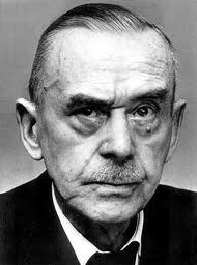 Thomas Mann
Thomas Mann
1875-1955
Thomas Mann (June 6, 1875-August 12, 1955) was a German novelist, short story writer, social critic, philanthropist, essayist and 1929 Nobel Prize laureate, known for his series of highly symbolic and ironic epic novels and novellas, noted for their insight into the psychology of the artist and the intellectual. His analysis and critique of the European and German soul used modernized German and Biblical stories, as well as the ideas of Goethe, Nietzsche and Schopenhauer. When Hitler came to power in 1933, Mann fled to Switzerland. When World War II broke out in 1939, he emigrated to the United States but returned to Switzerland in 1952.
Mann was born Paul Thomas Mann in Lubeck, Germany, and was the second son of Thomas Johann Heinrich Mann (a senator and a grain merchant) and his wife, Julia da Silva Bruhns (a Brazilian of partial German ancestry who emigrated to Germany when seven years old). His mother was Roman Catholic but Mann was baptized into his father’s Lutheran faith. Mann’s father died in 1891 and his trading firm was liquidated. The family subsequently moved to Munich. Mann attended the science division of a Lubeck Gymnasium (school), then spent time at the Ludwig Maximillians University of Munich and Technical University of Munich where, in preparation for a journalism career, he studied history, economics, art history and literature.
He lived in Munich from 1891 until 1933, with the exception of a year in Palestrina, Italy, with his novelist elder brother, Heinrich. Thomas worked with the South German Fire Insurance Company from 1894-95. His career as a writer began when he wrote for Simplicissimus. Mann’s first short story, “Little Mr. Friedemann” (“Der Kleine Herr Friedemann”), was published in 1898.
In 1929, Mann had a cottage built in the fishing village of Nidden (Nida, Lithuania) on the Curonian Spit, where there was a German art colony and where he spent the summers of 1930-32 working on Joseph and His Brothers. In 1933, after Hitler assumed power, Mann emigrated to Kusnacht, near Zurich, Switzerland, but received Czechoslovak citizenship and a passport in 1936. He then emigrated to the United States in 1939, where he taught at Princeton University.
In 1942, the Mann family moved to Pacific Palisades, in west Los Angeles, California, where they lived until after the end of World War II. On June 23, 1944 Thomas Mann was naturalized as a citizen of the United States. In 1952, he returned to Europe, to live in Kilchberg, near Zurich, Switzerland.
In 1955, he died of atherosclerosis in a hospital in Zurich and was buried in Kilchberg.
Source: http://en.wikipedia.org/wiki/Thomas_Mann
 Bibliography
Bibliography
Press your browser’s BACK button to return to the previous page.
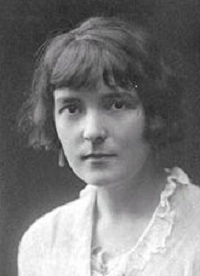 Katherine Mansfield
Katherine Mansfield
1888-1923
Kathleen Mansfield Beauchamp Murry (October 14, 1888-January 9, 1923) was a prominent modernist writer of short fiction who was born and brought up in colonial New Zealand and wrote under the pen name of Katherine Mansfield. Mansfield left for Great Britain in 1908.
Her stories often focus on moments of disruption and frequently open rather abruptly. Among her most well-known stories are: “The Garden Party,” “The Daughters of the Late Colonel” and “The Fly.”
During World War I, Mansfield contracted extrapulmonary tuberculosis, which rendered any return or visit to New Zealand impossible and led to her death at the age of 34.
Source: http://en.wikipedia.org/wiki/Katherine_Mansfield
 Bibliography
Bibliography
Press your browser’s BACK button to return to the previous page.
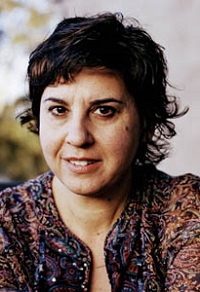 Melina Marchetta
Melina Marchetta
1965-
Melina Marchetta (born March 25, 1965) is an Australian writer and teacher. She is best known as the author of Looking for Alibrandi. She has twice been awarded the CBCA Book of the Year for Older Readers, in 1993 and 2004.
Marchetta born in Sydney and is of Italian descent. She attended high school at Rosebank College in the Sydney suburb of Five Dock. She left school at age 15 because she was not confident in her academic ability. She then enrolled in a business school, where she gained useful office skills, such as typing, which helped her gain employment with the Commonwealth Bank of Australia and later at a travel agency, where she worked as a consultant. This work gave her confidence to return to school and earn a teaching degree. She then got a job teaching at St. Mary’s Cathedral College, Sydney, in the heart of the Sydney CBD, until 2006. She now writes full time.
Her first novel, Looking for Alibrandi, was released in 1992. While writing the AFI award-winning screenplay, Marchetta taught English, Italian and history full-time for 10 years at a city high school for boys. During that time, she released her second novel, Saving Francesca, in 2003, followed by On the Jellicoe Road in 2006. Marchetta’s fourth novel, the fantasy epic Finnikin of the Rock, was released in 2008.
Marchetta has also written short stories, including “Twelve Minutes,” along with reviews and opinion pieces for The Sydney Morning Herald, The Australian and The Australian Literary Review. She has also been a writer-in-residence around the country, as far north as Thursday Island and as far south as Hobart.
Her fifth novel, The Piper’s Son, was released in Australia in 2010.
Source: http://en.wikipedia.org/wiki/Melina_Marchetta
 Bibliography
Bibliography
Press your browser’s BACK button to return to the previous page.
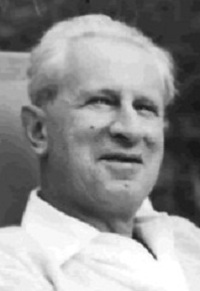 Herbert Marcuse
Herbert Marcuse
1898-1979
Herbert Marcuse (July 19, 1898-July 29, 1979) was a German Jewish philosopher, sociologist and political theorist associated with the Frankfurt School of critical theory. Celebrated as the “Father of the New Left,” his best-known works are Eros and Civilization and One-Dimensional Man.
Marcuse was born in Berlin to Carl Marcuse and Gertrud Kreslawsky and raised in a Jewish family. In 1916, he was drafted into the German Army but only worked in horse stables in Berlin during World War I. He then became a member of a Soldiers’ Council that participated in the aborted socialist Spartacist uprising. He completed his Ph.D thesis at the University of Freiburg in 1922 on the German Kunstlerroman, after which he moved back to Berlin and worked in publishing.
He returned to Freiburg in 1928 to study and write a habilitation with Martin Heidegger, which was published in 1932 as Hegel’s Ontology and Theory of Historicity. With his academic career blocked by the rise of the Third Reich, in 1933 Marcuse joined the Frankfurt Institute for Social Research.
Also in 1933, Marcuse published his first major review of Marx’s Economic and Philosophical Manuscripts of 1844. While a member of the Institute of Social Research, Marcuse developed a model for critical social theory, created a theory of the new stage of state and monopoly capitalism, described the relationships between philosophy, social theory and cultural criticism and provided an analysis and critique of German fascism.
In 1934, Marcuse immigrated to the United States, where he became a citizen in 1940. Although he never returned to Germany to live, he remained one of the major theorists associated with the Frankfurt School. In 1940, he published Reason and Revolution.
Marcuse’s critiques of capitalist society (especially his 1955 synthesis of Marx and Freud, Eros and Civilization, and his 1964 book, One-Dimensional Man) resonated with the concerns of the student movement in the 1960s. Because of his willingness to speak at student protests, Marcuse soon became known as “the father of the New Left in the United States.”
On July 29, 1979, 10 days after his 81st birthday, Marcuse died after having suffered a stroke during a visit to Germany.
Source: http://en.wikipedia.org/wiki/Herbert_Marcuse
 Bibliography
Bibliography
Press your browser’s BACK button to return to the previous page.
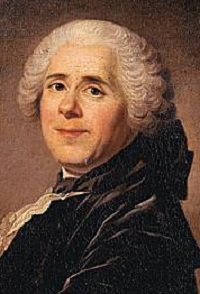 Pierre de Marivaux
Pierre de Marivaux
1688-1763
Pierre Carlet de Chamblain de Marivaux (February 4, 1688-February 12, 1763), commonly referred to as Marivaux, was a French novelist and dramatist.
He is considered one of the most important French playwrights of the 18th century, writing numerous comedies for the Comedie-Francaise and the Comedie-Italienne of Paris. His most important works are Le Triomphe de l’amour, Le Jeu de l’amour et du hasard and Les Fausses Confidences. He also published a number of essays and two important but unfinished novels, La Vie de Marianne and Le Paysan parvenu.
Marivaux is said to have written his first play, Pere prudent et equitable, when he was only 18, but it was not published until 1712, when he was 24. However, the young Marivaux concentrated more on writing novels than plays. In the three years from 1713 to 1715, he produced three novels – Effets surprenants de la sympathie; La Voiture embourbee; and a book that had three titles (Pharsamon, Les Folies romanesques and Le Don Quichotte modern).
The early 1720s were very important for Marivaux; he wrote a comedy (now mostly lost) called L’Amour et la verite, another comedy, Arlequin poli par l’amour, and an unsuccessful tragedy, Annibal (printed 1737).
Marivaux had a connection with the fashionable theatres: Annibal had played at the Comedie Francaise and Arlequin poli at the Comedie Italienne. He also endeavored to start a weekly newspaper, The Spectateur Francais, to which he was the sole contributor. But his irregular work ethic killed the paper after less than two years. Thus, for nearly 20 years, the theatre, especially the Comedie Italienne, was Marivaux’s chief support. His plays were well-received by the actors of the Comedie Francaise but were rarely successful there.
Marivaux wrote between 30 and 40 plays, the best of which are: Surprise de l’amour (1722), Triomphe de Plutus (1728), Jeu de l’amour et du hasard (The Game of Love and Chance, 1730), Les Fausses confidences (1737), all produced at the Italian theatre, and Le Legs (1736), produced at the French. At intervals, he returned to journalism: A periodical publication, called L’Indigent philosophe, appeared in 1727 and another, called Le Cabinet du philosophe, in 1734. But the same causes that had proved fatal to The Spectateur prevented these later efforts from succeeding.
In 1731, Marivaux published the first two parts of his great novel, Marianne. The 11 parts appeared at intervals over the next 11 years, but the novel was never finished. In 1735, another novel, Le Paysan parvenu, was begun, but this also was left unfinished. Marivaux was elected a member of the Academie francaise in 1742. For the next 20 years, he contributed occasionally to The Mercure, wrote plays and reflections.
He died on February 12, 1763, aged 75.
Source: http://en.wikipedia.org/wiki/Pierre_de_Marivaux
 Bibliography
Bibliography
Press your browser’s BACK button to return to the previous page.
 Kamala Markandaya
Kamala Markandaya
1924-2004
Kamala Markandaya (1924-May 16, 2004) was a pseudonym used by Kamala Purnaiya Taylor, an Indian novelist and journalist. A native of Mysore, India, Markandaya was a graduate of Madras University and afterward published several short stories in Indian newspapers. After India declared its independence, Markandaya moved to Britain, though she still labeled herself an Indian expatriate long afterward.
Known for writing about culture clashes between Indian urban and rural societies, Markandaya’s first published novel, Nectar in a Sieve, was a bestseller and named a notable book of 1955 by the American Library Association. Other novels include: Some Inner Fury (1955), A Silence of Desire (1960), Possession (1963), A Handful of Rice (1966), The Nowhere Man (1972), Two Virgins (1973), The Golden Honeycomb (1977) and Pleasure City (1982/1983).
Markandaya died in London on May 16, 2004.
Source: http://en.wikipedia.org/wiki/Kamala_Markandaya
 Bibliography
Bibliography
Press your browser’s BACK button to return to the previous page.
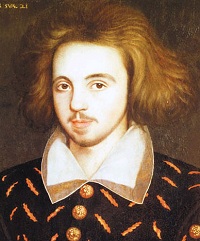 Christopher Marlowe
Christopher Marlowe
1564-1593
On February 26, 1564, at St George’s, Canterbury, Christopher Marlowe was baptized, the same year Shakespeare was born. His father was John Marlowe, a cobbler; his mother was named Katherine. Though Marlowe is used now, the family’s name had various spellings over the years. Not a lot is known of Marlowe’s childhood and there is some question as to the dates and chronology of some of his works.
With his scholarly potential acknowledged, Marlowe entered King’s School, Canterbury, in 1578, on scholarship from Matthew Parker, Archbishop of Canterbury, to study music, religion, Latin and literature. Two years later, he was off to Corpus Christi College, Cambridge, on another scholarship to study philosophy and history. He graduated in 1587 with an M.A. Sir Francis Walsingham recruited him, as well as many other men of letters at the time, to become a trusted government part-time secret service agent.
After years of performing plays in school Marlowe, wrote his own and is often credited as having founded English drama though his career was short. His earliest play features Jupiter and Ganymede in Dido, Queene of Carthage (1594) and is said to have been written during his Cambridge days. Marlowe worked on translations of Latin to English blank verse, including Ovid’s Amores, though it was banned by the Archbishop of Canterbury in 1599 as “unsemely.”
There was a successful run of Marlowe’s Tamburlaine the Great in 1587, performed by the Admiral’s Men, in which, during one performance, a woman was accidentally shot. In it, Tamburlaine wants to conquer heaven after conquering the world. The sequel was called The Second Part of the Bloody Conquests of Mighty Tamburlaine. Marlowe’s tragi-comical parody of Niccolo Machiavelli, The Jew of Malta, opened in 1592. Just a year later, he was arrested in the Netherlands for the petty treason act of counterfeiting gold coins but he was released on bail.
Massacre at Paris was first performed by Lord Strange’s men in 1593. His historical play, Edward II, is said to have paved the way for Shakespeare’s Richard II. Marlowe’s narrative rhyming couplet poem, “Hero and Leander” (1598), is based on the Greek poem by Musaeus and one edition is fondly dedicated to Sir Thomas Walsingham. “The Passionate Shepherd to His Love” is well-known and often quoted.
Speculation and controversy over Marlowe’s sexual orientation, religion and political views was growing. In the midst of Catholic and Protestant upheaval, he was charged, among other things, with atheism, blasphemy and subversion. While being tortured, a former roommate, Thomas Kyd, erroneously admitted that a document denying the divinity of Christ was written by Marlowe. Marlowe escaped imprisonment, however, likely by his government connections.
While there is some evidence that his death could have been faked, and there was a warrant issued for his arrest a week earlier, the popular conclusion is that on May 30, 1593, Marlowe died of a stab wound in a possible government safe house in Deptford.
Source: http://www.online-literature.com/marlowe/
 Bibliography
Bibliography
Press your browser’s BACK button to return to the previous page.
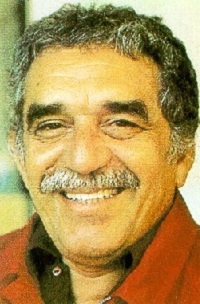 Gabriel Garcia Marquez
Gabriel Garcia Marquez
1927-2014
Gabriel Jose de la Concordia Garcia Marquez (born March 6, 1927) was a Colombian novelist, short-story writer, screenwriter and journalist, known affectionately as “Gabo” throughout Latin America. He was awarded the Nobel Prize in Literature in 1982.
He pursued a self-directed education that resulted in his leaving law school for a career in journalism. From early on, he showed no inhibitions in his criticism of Colombian and foreign politics.
He started as a journalist and has written many acclaimed nonfiction works and short stories, but is best known for his novels, such as One Hundred Years of Solitude (1967) and Love in the Time of Cholera (1985).
His works have achieved significant critical acclaim and widespread commercial success, most notably for popularizing a literary style labeled as “magical realism,” which uses magical elements and events in otherwise ordinary and realistic situations.
Marquez died April 17, 2014 at his home in Mexico City. He was 87.
Source: http://en.wikipedia.org/wiki/Gabriel_Garc%C3%ADa_M%C3%A1rquez
 Bibliography
Bibliography
Press your browser’s BACK button to return to the previous page.
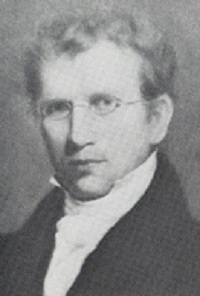 James Marsh
James Marsh
1794-1842
James Marsh was a Congregationalist minister, a professor of philosophy at the University of Vermont and, from 1826 to 1833, served as president of the University of Vermont. His chief contribution to American Transcendentalism is his publication, in 1829, of Samuel Taylor Coleridge’s Aids to Reflection, which contained aphorisms of both Coleridge and Archbishop Robert Leighton. This work introduced Americans to Coleridge and his views of German philosophical thought, in particular to the crucial distinction between understanding and reason – perhaps the key epistemological concept of the Romantic age. For Marsh and the New England Transcendentalists, the prevailing Lockean and Scottish metaphysical philosophies were unsatisfactory because they excluded the possibility of spiritual power and agency and were logically incompatible with an essentially spiritual religion. The principles advocated by Coleridge, on the other hand, directly challenged Locke and provided the reconciliation of religion and philosophy that reason demanded.
Marsh also edited Coleridge’s The Statesman’s Manual in 1832 and The Friend in 1833. His efforts encouraged the Transcendentalists in their path away from John Locke and toward a more spiritual, more fulfilling, more authentic gospel.
Source: http://www.alcott.net/alcott/home/champions/Marsh.html
 Bibliography
Bibliography
Press your browser’s BACK button to return to the previous page.
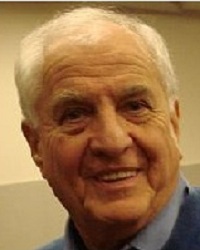 Garry Marshall
Garry Marshall
1934-2016
Garry Kent Marshall (November 13, 1934-July 19, 2016) was an American actor, director, writer and producer.
Marshall was born in the New York City borough of the Bronx, the son of Marjorie Irene (nee Ward), a tap dance teacher who ran a school for tap, and the late Anthony Wallace Marshall (1906-99), a director of industrial films and later a producer. He attended De Witt Clinton High School and Northwestern University, where he wrote a sports column for The Daily Northwestern, and was a member of the Alpha Tau Omega fraternity.
Marshall began his career as a joke writer for such comedians as Joey Bishop and Phil Foster, and then became a writer for The Tonight Show with Jack Paar. In 1961, he moved to Hollywood, where he teamed up with Jerry Belson as a writer for television. The pair worked on The Dick Van Dyke Show, The Joey Bishop Show, The Danny Thomas Show and The Lucy Show. They then adapted Neil Simon’s play, The Odd Couple, for television. On his own, Marshall created Happy Days, Laverne and Shirley, starring his sister Penny, and Mork & Mindy. He was also a co-creator of the short-lived sitcom, Makin’ It.
Marshall’s first feature film was Young Doctors in Love. In 1984, Marshall had a movie hit as the writer and director of The Flamingo Kid.
Marshall went on to focus on directing, with a series of hits such as Beaches, Pretty Woman, The Princess Diaries and Valentine’s Day.
Marshall’s theater credits include Wrong Turn at Lungfish, The Roast, Shelves and Happy Days: A New Musical with Paul Williams, which had its premiere in 2006.
On the morning of July 19, 2016, Marshall died at a hospital in Burbank, California at the age of 81 due to complications of pneumonia after suffering a stroke.
Source: http://en.wikipedia.org/wiki/Garry_Marshall
 Bibliography
Bibliography
Press your browser’s BACK button to return to the previous page.
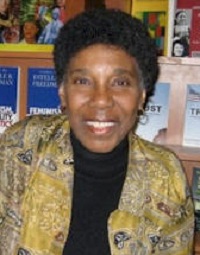 Paule Marshall
Paule Marshall
1929-2019
Paule Marshall (April 9, 1929-August 12, 2019) was an American author. She was born Valenza Pauline Burke in Brooklyn to Barbadian parents and educated at Girls High School, Brooklyn College (1953) and Hunter College (1955). Early in her career, she wrote poetry but later returned to prose. She was chosen by Langston Hughes to accompany him on a world tour in which they both read their work.
Marshall has taught at Virginia Commonwealth University, the University of California, Berkeley, the Iowa Writers’ Workshop and Yale University before holding the Helen Gould Sheppard Chair of Literature and Culture at New York University. In 1993, she received an honorary L.H.D. from Bates College. She lives in Richmond, Virginia.
She was a MacArthur Fellow and a past winner of the Dos Passos Prize for Literature. She was designated as a Literary Lion by the New York Public Library in 1994.
Marshall was inducted into the Celebrity Path at the Brooklyn Botanic Garden in 2001.
She died in Richmond, Virginia on August 12, 2019, having had dementia in her later years.
Source: http://en.wikipedia.org/wiki/Paule_Marshall
 Bibliography
Bibliography
Press your browser’s BACK button to return to the previous page.
 John Marston
John Marston
1576-1634
John Marston (baptized on October 7, 1576 in London-June 25, 1634) was an English poet, playwright and satirist during the late Elizabethan and early Jacobean periods.
Marston entered Brasenose College, Oxford, in 1592 and received his B.A. in 1594. By 1595, he was in London, living in the Middle Temple, where he had been admitted as a member three years previously. He had an interest in poetry and playwriting, although his father’s will of 1599 expresses the hope that he would give up such vanities.
Marston’s brief career in literature began with a foray into the then-fashionable genres of erotic epyllion and satire. In 1598, he published The Metamorphosis of Pigmalian’s Image and Certaine Satyres, a book of poetry in imitation of, on the one hand, Ovid, and, on the other, the Satires of Juvenal. He also published another book of satires, The Scourge of Villanie, in 1598.
In September 1599, Marston began to work for Philip Henslowe as a playwright. He proved a good match for the stage. Traditionally, though without strong external attribution, Histriomastix has been regarded as his first play. In c. 1600, Marston wrote Jack Drum’s Entertainment, Antonio and Mellida and, in 1601, Antonio’s Revenge, a sequel to the latter play. In 1601, he contributed poems to Robert Chester’s Love’s Martyr. For Henslowe, he may have collaborated with Dekker, Day and Haughton on Lust’s Dominion.
Marston’s career continued to prosper. In 1603, he became a shareholder in the Children of Blackfriars company, at that time known for steadily pushing the allowable limits of personal satire, violence and lewdness on stage. He wrote and produced two plays with the company: The Malcontent (1603) and The Dutch Courtesan (1604-05). In 1605, he worked with George Chapman and Ben Jonson on Eastward Ho.
In 1606, Marston seems to have offended and then soothed King James. First, in Parasitaster, or the Fawn, he satirized the king. However, in the summer of that year, he produced The Dutch Courtesan for the King of Denmark’s visit. Finally, in 1607, he wrote The Entertainment at Ashby, a masque for the Earl of Huntingdon. At that point, he stopped his dramatic career altogether. His departure from the literary scene may have been because of another play, now lost, that offended the king.
In 1609, he became a reader at the Bodleian Library at Oxford, was made a deacon on September 24 and a priest on December 24, 1609. In October 1616, Marston was assigned the living of Christchurch, Hampshire.
He died on June 24, 1634, in London and was buried in the Middle Temple Church.
Source: http://en.wikipedia.org/wiki/John_Marston
 Bibliography
Bibliography
Press your browser’s BACK button to return to the previous page.
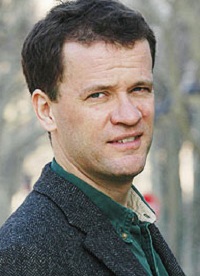 Yann Martel
Yann Martel
1963-
Yann Martel (born June 25, 1963) is a Canadian author best known for the Man Booker Prize-winning novel, Life of Pi.
Martel was born in Salamanca, Spain, the son of Nicole Perron and Emile Martel. His parents were French-Canadian. His father was posted as a diplomat for the Canadian government at the time of his birth. He was raised in Costa Rica, France, Mexico and Canada. As an adolescent, Martel attended high school at Trinity College School, a boarding school in Port Hope, Ontario. As an adult, Martel spent time in Iran, Turkey and India. After studying philosophy at Trent University in Peterborough, Ontario, Martel spent 13 months in India visiting masjids, churches, temples and zoos, then two years reading religious texts and castaway stories. His first published fictional work, Seven Stories, appeared in 1993.
In 2001, he published Life of Pi, which was awarded the Man Booker Prize in 2002.
Martel spent a year in Saskatoon, Saskatchewan, from September 2003 as the public library’s writer-in-residence. In November 2005, the University of Saskatchewan announced that Martel would be scholar-in-residence. He continues to have an office at the university.
His novel, Beatrice and Virgil, deals with the Holocaust.
From 2007 to 2011, Martel worked on a project entitled What Is Stephen Harper Reading?, where he sent the Prime Minister of Canada (Harper) one book every two weeks that portrays “stillness” with an accompanying explanatory note. He posted his letters, book selections and responses received to a Web site devoted to the project. A book-length account of the project was published in the fall of 2009. Martel ended the project in February 2011 after sending Harper a total of 100 books.
Source: http://en.wikipedia.org/wiki/Yann_Martel
 Bibliography
Bibliography
Press your browser’s BACK button to return to the previous page.
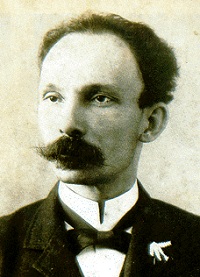 Jose Marti
Jose Marti
1853-1895
Jose Julian Marti Perez (January 28, 1853-May 19, 1895) was a Cuban national hero and an important figure in Latin American literature. In his short life he was a poet, essayist, journalist, revolutionary philosopher, translator, professor, publisher and political theorist. He was also a part of the Cuban Freemasons. Through his writings and political activity, he became a symbol for Cuba’s bid for independence against Spain in the 19th century and is referred to as the “Apostle of Cuban Independence.” He also fought against the threat of United States expansionism into Cuba. From adolescence, he dedicated his life to the promotion of liberty, political independence for Cuba and intellectual independence for all Spanish Americans; his death was used as a cry for Cuban independence from Spain by both the Cuban revolutionaries and those Cubans previously reluctant to start a revolt.
Born in Havana, Marti began his political activism at an early age. He would travel extensively in Spain, Latin America and the United States, raising awareness and support for the cause of Cuban independence. His unification of the Cuban emigre community, particularly in Florida, was crucial to the success of the Cuban War of Independence against Spain. He was a key figure in the planning and execution of this war, as well as the designer of the Cuban Revolutionary Party and its ideology.
His written works consist of a series of poems, essays, letters, lectures, a novel and even a children’s magazine. He wrote for numerous Latin American and American newspapers; he also founded a number of newspapers. His newspaper, Patria, was a key instrument in his campaign for Cuban independence. After his death, one of his poems from the book, Versos Sencillos (Simple Verses), was adapted to the song, “Guantanamera,” which has become the definitive patriotic song of Cuba.
Marti was killed in battle against Spanish troops at the Battle of Dos Rios, near the confluence of the rivers Contramaestre and Cauto, on May 19, 1895.
Source: http://en.wikipedia.org/wiki/Jos%C3%A9_Mart%C3%AD
 Bibliography
Bibliography
Press your browser’s BACK button to return to the previous page.
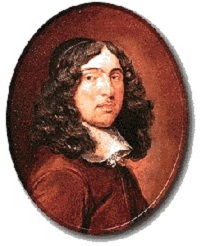 Andrew Marvell
Andrew Marvell
1621-1678
Andrew Marvell was born at Winestead-in-Holderness, Yorkshire, on March 31, 1621, to the Rev. Andrew Marvell and his wife, Anne. He was educated at the Hull Grammar School and, in 1633, he matriculated as a Sizar of Trinity College, Cambridge. Two poems by Marvell, one in Greek and one in Latin, were printed in the Musa Cantabrigiensis in 1637. In 1638, Marvell was admitted a Scholar of Trinity College and took his B.A. degree in the same year. A few days after receiving his scholarship, Marvell’s mother died. He remained a few more years in residence, leaving Cambridge only after his father’s death, by drowning, in 1640.
In the years that followed, he traveled abroad in France, Holland, Switzerland, Spain and Italy. In 1650, Marvell became the tutor of 12-year-old Mary Fairfax (later Duchess of Buckingham), daughter of Sir Thomas Fairfax, retired Lord General of the parliamentary forces. At the Yorkshire seat of the Fairfax family, Nun Appleton House, Marvell seems to have written, over a period of about three years, most of his non-satiric English poems. The sojourn provided material for Marvell’s most profound poem, “Upon Appleton House,” crucial to his development both as a man and a poet. To the same period probably belong Marvell’s “To His Coy Mistress” and “The Definition of Love.”
In September 1657, Marvell was appointed assistant to John Milton, Latin Secretary for the Commonwealth. Marvell was paid a salary of £200, the same as Milton, although his was not a lifetime pension. In his quiet way he seems to have been helpful after the Restoration (1660) in saving Milton from an extended jail term and possible execution. Starting in 1659, Marvell was elected M.P. for his hometown of Hull and continued to represent it until his death.
During his last 20 years of his life, Marvell was engaged in political activities, taking part in embassies to Holland and Russia and writing political pamphlets and satires. Marvell’s Miscellaneous Poems were printed posthumously in 1681.
Marvell died on August 16, 1678, of tertian ague and the malpractice of the attending physician. He was buried in the church of St. Giles-in-the-Fields.
Source: http://www.luminarium.org/sevenlit/marvell/marvbio.htm
 Bibliography
Bibliography
Press your browser’s BACK button to return to the previous page.
 Karl Marx
Karl Marx
1818-1883
Karl Heinrich Marx (May 5, 1818-March 14, 1883) was a German philosopher, economist, sociologist, historian, journalist and revolutionary socialist. His ideas played a significant role in the development of social science and the socialist political movement. He published various books during his lifetime, with the most notable being The Communist Manifesto (1848) and Capital (1867-1894); some of his works were co-written with his friend and fellow German revolutionary socialist, Friedrich Engels.
Born into a wealthy middle-class family in Trier, formerly in the Prussian Rhineland now called Rhineland-Palatinate, Marx studied at both the University of Bonn and the University of Berlin, where he became interested in the philosophical ideas of the Young Hegelians. After his studies, he wrote for a radical newspaper in Cologne and began to work out his theory of dialectical materialism. Moving to Paris in 1843, he began writing for other radical newspapers.
He met Engels in Paris and the two men worked together on a series of books. Exiled to Brussels, he became a leading figure of the Communist League before moving back to Cologne, where he founded his own newspaper. In 1849, he was exiled again and moved to London with his wife and children. In London, where the family was reduced to poverty, Marx continued writing and formulating his theories about the nature of society and how he believed it could be improved, as well as campaigning for socialism and becoming a significant figure in the International Workingmen’s Association.
Marx’s theories about society, economics and politics, which are collectively known as Marxism, hold that all societies progress through the dialectic of class struggle – a conflict between an ownership class that controls production and a lower class that produces the labor for such goods. Heavily critical of the current socio-economic form of society, capitalism, he called it the “dictatorship of the bourgeoisie,” believing it to be run by the wealthy classes purely for their own benefit, and predicted that, like previous socioeconomic systems, it would inevitably produce internal tensions that would lead to its self-destruction and replacement by a new system, socialism.
He died of bronchitis and pleurisy in London on March 14, 1883.
Source: http://en.wikipedia.org/wiki/Karl_Marx
 Bibliography
Bibliography
Press your browser’s BACK button to return to the previous page.
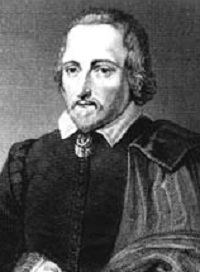 Philip Massinger
Philip Massinger
1583-1640
Philip Massinger (baptized on November 24, 1583-March 17, 1640) was an English dramatist. His finely plotted plays, including A New Way to Pay Old Debts, The City Madam and The Roman Actor, are noted for their satire and realism, as well as for their political and social themes.
The son of Arthur Massinger or Messenger, he was baptized at St. Thomas’ in Salisbury on November 24, 1583. He is described in his matriculation entry at St. Alban Hall, Oxford (1602), as the son of a gentleman. Massinger left Oxford without a degree in 1606. His father had died in 1603, which may have left him without financial assistance. On leaving the university, he went to London to make his living as a dramatist, but his name cannot be definitely affixed to any play until 15 years later when The Virgin Martyr (1621) appeared as the work of Massinger and Thomas Dekker. During these years, he worked in collaboration with other dramatists.
After Philip Henslowe’s death in 1616, Massinger and Fletcher began to write for the King’s Men. Between 1623 and 1626, Massinger produced three pieces: The Parliament of Love, The Bondman and The Renegado. With the exception of these plays and The Great Duke of Florence, produced in 1627 by Queen Henrietta’s Men, Massinger continued to write regularly for the King’s Men until his death, including The Maid of Honour (1632).
Massinger died suddenly at his house near the Globe Theatre and was buried in the churchyard of St. Saviour’s, Southwark, on March 18, 1640.
Source: http://en.wikipedia.org/wiki/Philip_Massinger
 Bibliography
Bibliography
Press your browser’s BACK button to return to the previous page.
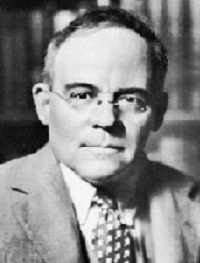 Edgar Lee Masters
Edgar Lee Masters
1868-1950
Edgar Lee Masters (August 23, 1868-March 5, 1950) was an American poet, biographer and dramatist. He is the author of Spoon River Anthology, The New Star Chamber and Other Essays, Songs and Satires, The Great Valley, The Serpent in the Wilderness: An Obscure Tale, The Spleen, Mark Twain: A Portrait, Lincoln: The Man and Illinois Poems. In all, Masters published 12 plays, 21 books of poetry, six novels and six biographies, including those of Abraham Lincoln, Mark Twain, Vachel Lindsay and Walt Whitman.
Born to Emma J. Dexter and Hardin Wallace Masters in Garnett, Kansas, where his father had briefly moved to set up a law practice, the family soon moved back to his paternal grandparents’ farm near Petersburg in Menard County, Illinois. In 1880, they moved to Lewistown, Illinois, where he attended high school and had his first publication in The Chicago Daily News. The culture around Lewistown, in addition to the town’s cemetery at Oak Hill, and the nearby Spoon River, were the inspirations for many of his works, most notably Spoon River Anthology, his most famous and acclaimed work.
Masters attended The Knox Academy from 1889-1890, a defunct preparatory program run by Knox College, but was forced to leave due to his family’s inability to finance his education.
After working in his father’s law office, he was admitted to the Illinois bar and moved to Chicago, where he established a law partnership with Kickham Scanlan in 1893. In 1898, he married Helen M. Jenkins, the daughter of a lawyer in Chicago, and had three children. During his law partnership with Clarence Darrow, from 1903 to 1908, Masters defended the poor. In 1911, he started his own law firm, despite three years of unrest (1908-1911) due to extramarital affairs and an argument with Darrow.
Masters died at a nursing home on March 5, 1950, in Melrose Park, Pennsylvania, aged 81. He is buried in Oakland Cemetery in Petersburg, Illinois.
Source: http://en.wikipedia.org/wiki/Edgar_Lee_Masters
 Bibliography
Bibliography
Press your browser’s BACK button to return to the previous page.
 Cotton Mather
Cotton Mather
1663-1728
Cotton Mather, FRS (February 12, 1663-February 13, 1728) was a socially and politically influential New England Puritan minister, prolific author and pamphleteer; he is often remembered for his role in the Salem witch trials. He was the son of Increase Mather and grandson of both John Cotton and Richard Mather, all prominent Puritan ministers.
Mather was named after his maternal grandfather, John Cotton. He attended Boston Latin School, where his name was posthumously added to its Hall of Fame, and graduated from Harvard in 1678 at age 15. After completing his post-graduate work, he joined his father as assistant pastor of Boston’s original North Church. In 1685, Mather assumed full responsibilities as pastor at the church.
Mather wrote more than 450 books and pamphlets and his ubiquitous literary works made him one of the most influential religious leaders in America. Mather set the moral tone in the colonies and sounded the call for second- and third-generation Puritans, whose parents had left England for the New England colonies of North America, to return to the theological roots of Puritanism.
The most important of these, Magnalia Christi Americana (1702), comprises seven distinct books, many of which depict biographical and historical narratives to which later American writers, such as Nathaniel Hawthorne, Elizabeth Drew Stoddard and Harriet Beecher Stowe, would look in describing the cultural significance of New England for later generations after the American Revolution. Mather, as a Puritan thinker and social conservative, drew on the language of the Bible to speak to contemporary audiences. In particular, his review of the American experiment sought to explain signs of his time and the types of individuals drawn to the colonies as predicting the success of the venture. From his religious training, Mather viewed the importance of texts for elaborating meaning and for bridging different moments of history – linking, for instance, the Biblical stories of Noah and Abraham with the arrival of such eminent leaders as John Eliot, John Winthrop and his own father, Increase Mather.
Highly influential because of his prolific writing, Mather was a force to be reckoned with in secular, as well as in spiritual, matters. After the fall of James II of England, in 1688, Mather was among the leaders of the successful revolt against James’ governor of the consolidated Dominion of New England, Sir Edmund Andros.
Cotton Mather was not known for writing in a neutral, unbiased perspective. Many, if not all, of his writings had bits and pieces of his own personal life in them or were written for personal reasons.
Mather also influenced early American science. In 1716, because of observations of corn varieties, he conducted one of the first recorded experiments with plant hybridization.
In November 1713, Mather’s wife, newborn twins and two-year-old daughter all succumbed during a measles epidemic. Of Mather’s three wives and 15 children, only his last wife and two children survived him. Mather was buried on Copp’s Hill, near Old North Church.
Source: http://en.wikipedia.org/wiki/Cotton_Mather
 Bibliography
Bibliography
Press your browser’s BACK button to return to the previous page.
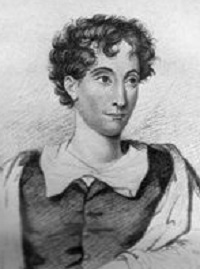 Charles Robert Maturin
Charles Robert Maturin
1782-1824
Charles Robert Maturin, also known as C.R. Maturin (September 25, 1782-October 30, 1824) was an Anglo-Irish Protestant clergyman (ordained by the Church of Ireland) and a writer of Gothic plays and novels.
Maturin was born in Dublin, Ireland, and attended Trinity College. Shortly after being ordained as curate of Loughrea in 1803, he became Anglican Curate of St. Peter’s Church in Dublin.
His first three works were published under the pseudonym Dennis Jasper Murphy and were critical and commercial failures. They did, however, catch the attention of Sir Walter Scott, who recommended Maturin’s work to Lord Byron. With the help of these two literary luminaries, the curate’s play, Bertram (first staged on May 9, 1816, at the Drury Lane for 22 nights) saw a wider audience and became a success. Financial success, however, eluded Maturin, as the play’s run coincided with his father’s unemployment and another relative’s bankruptcy, both of them assisted by the fledgling writer. Forced to support his wife and four children by writing (his salary as curate was £80-90 per annum, compared to the £1000 he made for Bertram), he switched back from playwright to novelist after a string of his plays met with failure.
Maturin died in Dublin on October 30, 1824. Honore de Balzac and Charles Baudelaire later expressed fondness for Maturin’s work, particularly his most famous novel, Melmoth the Wanderer.
Source: http://en.wikipedia.org/wiki/Charles_Maturin
 Bibliography
Bibliography
Press your browser’s BACK button to return to the previous page.
 W. Somerset Maugham
W. Somerset Maugham
1874-1965
William Somerset Maugham (January 25, 1874-December 16, 1965) was an English playwright, novelist and short story writer.
Maugham’s father, Robert Ormond Maugham, was an English lawyer who handled the legal affairs of the British embassy in Paris, France. Because French law declared that all children born on French soil could be conscripted for military service, his father arranged for Maugham to be born at the embassy, technically on British soil. Maugham’s mother, Edith Mary (nee Snell), had tuberculosis, a condition for which her doctor prescribed childbirth.
In Germany, he studied literature, philosophy and German at Heidelberg University. During his year in Heidelberg, he wrote his first book, a biography of opera composer Giacomo Meyerbeer.
On his return to England, his uncle found Maugham a position in an accountant’s office but, after a month, Maugham gave it up and returned to Whitstable. For the next five years, he studied medicine at St. Thomas’ Hospital in Lambeth, London.
Some critics have assumed that the years Maugham spent studying medicine were a creative dead end, but Maugham felt differently. He was living in the great city of London, meeting people of a “low” sort whom he would never have met otherwise and seeing them at a time of heightened anxiety and meaning in their lives.
Maugham kept his own lodgings, took pleasure in furnishing them, filled many notebooks with literary ideas and continued writing nightly while at the same time studying for his medical degree. In 1897, he wrote his second book, Liza of Lambeth, a tale of working-class adultery and its consequences. Liza of Lambeth’s first print run sold out in a matter of weeks. Maugham, who had qualified as a doctor, dropped medicine and embarked on his 65-year career as a man of letters.
In 1907, he saw another success with his play, Lady Frederick. By the next year, he had four plays running simultaneously in London. Maugham’s supernatural thriller, The Magician, was published in 1907. By 1914, Maugham was famous with 10 plays produced and 10 novels published.
Maugham moved back to England and then, in 1946, to his villa in France, where he lived, interrupted by frequent and long travels, until his death of pneumonia in 1965.
Source: http://en.wikipedia.org/wiki/W._Somerset_Maugham
 Bibliography
Bibliography
Press your browser’s BACK button to return to the previous page.
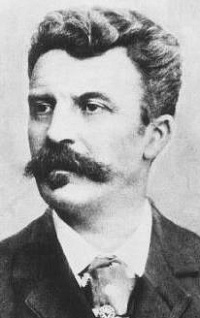 Guy de Maupassant
Guy de Maupassant
1850-1893
Henri Rene Albert Guy de Maupassant (August 5, 1850-July 6, 1893) was a popular 19th century French writer, considered one of the fathers of the modern short story and one of the form’s finest exponents.
Maupassant was born at the chateau de Miromesnil, near Dieppe, in the Seine-Inferieure department in France.
He first entered a seminary at Yvetot but deliberately got himself expelled. From his early education, he retained a marked hostility to religion. Then he was sent to the Lycee Pierre-Corneille in Rouen, where he proved a good scholar, indulging in poetry and taking a prominent part in theatricals.
The Franco-Prussian War broke out soon after his graduation from college in 1870; he enlisted as a volunteer and fought bravely. Afterward, in 1871, he left Normandy and moved to Paris, where he spent 10 years as a clerk in the Navy Department. During these tedious years, his only recreation and relaxation was canoeing on the Seine on Sundays and holidays. Gustave Flaubert took him under his protection and acted as a kind of literary guardian to him, guiding his debut in journalism and literature.
In 1878, he was transferred to the Ministry of Public Instruction and became a contributing editor of several leading newspapers, such as Le Figaro, Gil Blas, Le Gaulois and l’Echo de Paris. He devoted his spare time to writing novels and short stories.
In 1880, he published what is considered his first masterpiece, Boule de Suif, which met with instant and tremendous success. This was followed by short stories, such as “Deux Amis,” “Mother Savage” and “Mademoiselle Fifi.” The decade from 1880 to 1891 was the most fertile period of Maupassant’s life. Made famous by his first short story, he worked methodically and produced two or sometimes four volumes annually.
In 1881, he published his first volume of short stories, La Maison Tellier; in 1883, he finished his first novel, Une Vie (translated into English as A Woman’s Life). His second novel, Bel-Ami, came out in 1885. His editor, Havard, commissioned him to write new masterpieces and Maupassant continued to produce them without the slightest apparent effort. At this time, he wrote what many consider to be his greatest novel, Pierre et Jean.
In his later years, he developed a constant desire for solitude, an obsession for self-preservation, a fear of death and a crazed paranoia of persecution that came from the syphilis he had contracted in his early days. On January 2, 1892, Maupassant tried to commit suicide by cutting his throat and was committed to the celebrated private asylum of Dr. Esprit Blanche at Passy, in Paris, where he died on July 6, 1893.
Source: http://en.wikipedia.org/wiki/Guy_de_Maupassant
 Bibliography
Bibliography
Press your browser’s BACK button to return to the previous page.
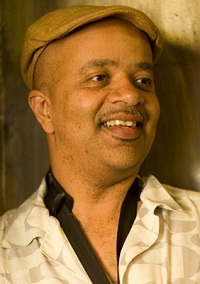 James McBride
James McBride
1957-
James McBride (born September 11, 1957) is an American writer and musician whose compositions have been recorded by a variety of other musicians.
McBride’s father, the late Rev. Andrew D. McBride, who died of lung cancer at age 45, was African-American, and his mother, Ruchel Dwajra Zylska, was a Jewish immigrant from Poland. He was raised in Brooklyn’s Red Hook housing projects.
He earned an undergraduate degree in music composition from Oberlin College in 1979 and then received a master’s degree in journalism from Columbia University.
As a journalist, he was on the staffs of many well-known publications, including The Boston Globe, The Washington Post, The Wilmington (Delaware) News Journal and People magazine. He has written pieces for Rolling Stone magazine, Us magazine, The Chicago Tribune, The Philadelphia Inquirer, Essence, The New York Times and others.
McBride is best known for his 1996 memoir, the bestselling The Color of Water. In 2002, he published a novel, Miracle at St. Anna. In 2005, he published the first volume of The Process, a CD-based documentary about life as lived by low-profile jazz musicians. His next novel, Song Yet Sung, was published in 2008.
McBride lives in New York. He is married and has three children; Azure, Jordan and Nash.
Source: http://en.wikipedia.org/wiki/James_McBride_%28writer%29
 Bibliography
Bibliography
Press your browser’s BACK button to return to the previous page.
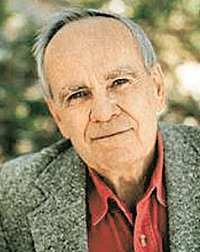 Cormac McCarthy
Cormac McCarthy
1933-2023
Cormac McCarthy (born Charles McCarthy; July 20, 1933) was an American novelist and playwright. He wrote 10 novels, spanning the Southern Gothic, Western and Modernist genres.
McCarthy’s first novel, The Orchard Keeper, was published in 1965. In the summer of 1965, using a Traveling Fellowship award from the American Academy of Arts and Letters, McCarthy shipped out aboard the liner Sylvania, hoping to visit Ireland. Also in 1966, McCarthy received a Rockefeller Foundation Grant, which he used to travel around Southern Europe before landing in Ibiza, where he wrote his second novel, Outer Dark.
In 1969, McCarthy moved to Louisville, Tennessee, and wrote his next book, Child of God, which was published in 1973. In 1979, his novel Suttree, which he had been writing on and off for 20 years, was finally published.
Supporting himself with the money from his 1981 MacArthur Fellowship, he wrote his next novel, Blood Meridian, or the Evening Redness in the West, which was published in 1985.
McCarthy finally received widespread recognition in 1992 with the publication of All the Pretty Horses, which won the National Book Award and the National Book Critics Circle Award. It was followed by The Crossing and Cities of the Plain, completing the Border Trilogy.
In the midst of this trilogy came The Stonemason, McCarthy’s second dramatic work. He had previously written a film for PBS in the 1970s, The Gardener’s Son. McCarthy’s next book, 2005’s No Country for Old Men, stayed with the Western setting and themes yet moved to a more contemporary period. McCarthy’s book, The Road (2006), won international acclaim and the Pulitzer Prize for literature. Also in 2006, McCarthy published the play, The Sunset Limited.
McCarthy died of natural causes at his home in Santa Fe on June 13, 2023, at the age of 89.
Source: http://en.wikipedia.org/wiki/Cormac_McCarthy
 Bibliography
Bibliography
Press your browser’s BACK button to return to the previous page.
 Mary McCarthy
Mary McCarthy
1912-1989
Mary Therese McCarthy (June 21, 1912-October 25, 1989) was an American author, critic and political activist.
Born in Seattle, Washington, to Roy Winfield McCarthy and his wife, the former Therese Preston, McCarthy was orphaned at the age of six when both her parents died in the great flu epidemic of 1918. She studied at the Forest Ridge School of the Sacred Heart in Seattle and went on to graduate from Vassar College in Poughkeepsie, New York, in 1933.
Her debut novel, The Company She Keeps, received critical acclaim as a succes de scandale, depicting the social milieu of New York intellectuals of the late 1930s with unreserved frankness. After building a reputation as a satirist and critic, McCarthy enjoyed popular success with her 1963 novel, The Group.
McCarthy was a member of the National Institute of Arts and Letters. In 1973, she delivered the prestigious Huizinga Lecture in Leiden, the Netherlands, under the title “Can There Be a Gothic Literature?” She won the National Medal for Literature and the Edward MacDowell Medal in 1984.
McCarthy died of lung cancer on October 25, 1989, at New York-Presbyterian Hospital in New York City.
Source: http://en.wikipedia.org/wiki/Mary_McCarthy_%28author%29
 Bibliography
Bibliography
Press your browser’s BACK button to return to the previous page.
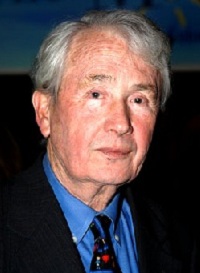 Frank McCourt
Frank McCourt
1930-2009
Francis “Frank” McCourt (August 19, 1930-July 19, 2009) was an Irish-American teacher and Pulitzer Prize-winning writer, best known as the author of Angela’s Ashes, a tragicomic memoir of the misery and squalor of his childhood.
McCourt was born in Brooklyn, New York, to father Malachy McCourt (1901-1985) and Irish-Catholic mother Angela Sheehan (1908-1981). He lived in New York with his parents and four younger siblings.
Unable to find steady work because of the Depression and Malachy’s alcoholism, the McCourt family returned to their mother’s native Limerick, Ireland, in 1934. McCourt’s school education ended at age 14, when the Congregation of Christian Brothers rejected him, despite a recommendation from his teacher. He then held odd jobs and stole bread and milk in an effort to provide for his mother and three surviving brothers.
In October 1949, at the age of 19, he left Ireland on the MS Irish Oak that was supposed to stop in New York City but instead went up to Albany, New York. He took a train into New York City with a priest he had met on the ship, who got him a room to stay in and his job at New York City’s Biltmore Hotel, making about $26 a week and sending $10 of it to his mother in Limerick. In 1951, he was drafted in the U.S. Army during the Korean War and was sent to Bavaria, Germany for two years, initially training dogs, then as a clerk. Upon his discharge from the Army, he returned to New York City, where he held a series of jobs on docks, in warehouses and in banks.
Using his GI Bill from the Army, he graduated in 1957 from New York University with a bachelor’s degree in English. He taught at six New York schools, including McKee Vocational and Technical High School in Staten Island, New York City College of Technology in Brooklyn, Stuyvesant High School, Seward Park High School, Washington Irving High School and the High School of Fashion Industries, all in Manhattan. In 1967, he earned his master’s degree at Brooklyn College and in the late ’60s spent 18 months at Trinity College in Dublin, failing to earn his Ph.D before returning to New York City.
He received the Pulitzer Prize (1997) and National Book Critics Circle Award (1996) for his memoir, Angela’s Ashes (1996), which details his impoverished childhood in Limerick. He also authored ’Tis (1999), which continues the narrative of his life, picking up from the end of the previous book and focusing on life as a new immigrant in America. Teacher Man (2005) detailed the challenges of being a young, uncertain teacher.
It was announced in May 2009 that McCourt had been treated for melanoma and that he was in remission, undergoing home chemotherapy. On July 19, 2009, he died from the cancer, with meningeal complications, at a hospice in Manhattan.
Source: http://en.wikipedia.org/wiki/Frank_McCourt
 Bibliography
Bibliography
Press your browser’s BACK button to return to the previous page.
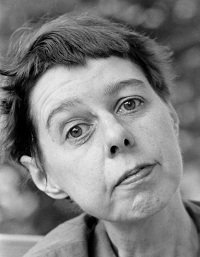 Carson McCullers
Carson McCullers
1917-1967
Carson McCullers (February 19, 1917-September 29, 1967) was an American writer. She wrote novels, short stories and two plays, as well as essays and some poetry.
She was born Lula Carson Smith in Columbus, Georgia in 1917. She graduated from Columbus High School. In September 1934, at age 17, she left home on a steamship from Savannah, Georgia, planning to study piano at the Juilliard School of Music in New York City. After losing the money set aside for her tuition, she never attended the school. McCullers worked in menial jobs and studied creative writing under the Texas writer, Dorothy Scarborough, at night classes at Columbia University, and with Sylvia Chatfield Bates at Washington Square College of New York University. In 1936, she published her first work. “Wunderkind,” an autobiographical piece that Bates had much admired, appeared in Story magazine.
In Charlotte and Fayetteville, North Carolina, McCullers wrote her first novel, The Heart Is a Lonely Hunter, in the Southern Gothic tradition.
McCullers published eight books: The Heart Is a Lonely Hunter (1940), written at the age of 23, Reflections in a Golden Eye (1941) and The Member of the Wedding (1946) are the best known. The novella, The Ballad of the Sad Cafe (1951), depicts loneliness and the pain of unrequited love.
In 1957, she wrote her bittersweet play, The Square Root of Wonderful. Her novel, The Member of the Wedding (1946), describes the feelings of a young girl at her brother’s wedding.
McCullers suffered throughout her life from several illnesses and from alcoholism. She also contracted rheumatic fever at the age of 15 and suffered from strokes that began in her youth. By the age of 31, her left side was entirely paralyzed. She died in Nyack, New York, on September 29, 1967, after a brain hemorrhage.
Source: http://en.wikipedia.org/wiki/Carson_McCullers
 Bibliography
Bibliography
Press your browser’s BACK button to return to the previous page.
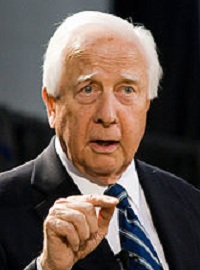 David McCullough
David McCullough
1933-2022
David Gaub McCullough (born July 7, 1933) was an American author, narrator, historian and lecturer. He was a two-time winner of the Pulitzer Prize and the National Book Award and a recipient of the Presidential Medal of Freedom, the United States’ highest civilian award.
Born and raised in Pittsburgh, McCullough earned a degree in English literature from Yale University. His first book was The Johnstown Flood (1968); he has since written eight more books on such topics as Harry S Truman, John Adams and the Brooklyn Bridge. McCullough has also narrated multiple documentaries, as well as the 2003 film Seabiscuit; and he hosted the PBS series American Experience for 12 years.
McCullough’s two Pulitzer Prize-winning books, Truman and John Adams, have been adapted by HBO into a TV film and a mini-series, respectively. McCullough’s work, The Greater Journey, about Americans in Paris from the 1830s to the 1900s, was released on May 24, 2011.
After a period of failing health, McCullough died at his home in Hingham on August 7, 2022, at age 89.
Source: http://en.wikipedia.org/wiki/David_McCullough
 Bibliography
Bibliography
Press your browser’s BACK button to return to the previous page.
 Robert S. McElvaine
Robert S. McElvaine
1947-
Robert S. McElvaine is Elizabeth Chisholm Professor of Arts and Letters and Chair of the Department of History at Millsaps College in Jackson, Mississippi, where he has taught for 35 years. He is the author of seven books and the editor of three.
He is considered one of the world’s leading historians of the Great Depression. His first two books on the Depression era have become standards in the field. His best-known book, The Great Depression: America, 1929-1941, was published in 1993. McElvaine’s articles and opinion pieces appear frequently in such publications as The New York Times, The Washington Post, The Los Angeles Times, The Wall Street Journal, The New York Times Book Review, Newsweek and The Nation.
He has received many awards for his teaching, including a silver medal in the national Professor of the Year program of the Council for the Advancement and Support of Education, was named Millsaps College’s Distinguished Professor in 2001 and won the Carnegie Endowment Professor of the Year Award in Mississippi in 2002.
He has lectured in the United States, Europe, Africa and Australia on his ideas about the central influence on human history of various misconceptions and metaphors about sex that form the basis of Eve’s Seed. McElvaine’s latest book, Grand Theft Jesus: The Hijacking of Religion in America, was published in 2008.
In 2007, he wrote an extensive analysis of the current economic conditions in comparison with those of the 1920s, “If (Economic) History Doesn’t Repeat Itself, Does It Rhyme?” in which he predicted a coming collapse similar to what had happened in 1929.
Source: http://en.wikipedia.org/wiki/Robert_S._McElvaine
 Bibliography
Bibliography
Press your browser’s BACK button to return to the previous page.
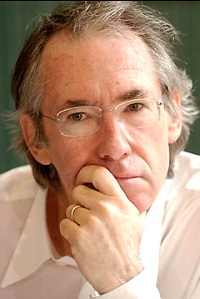 Ian McEwan
Ian McEwan
1948-
Ian Russell McEwan (born June 21, 1948) is a British novelist and screenwriter.
McEwan was born in Aldershot, Hampshire, the son of David McEwan and Rose Lilian Violet (nee Moore). He spent much of his childhood in East Asia (including Singapore), Germany and North Africa (including Libya), where his father, a Scottish army officer, was posted. His family returned to England when he was 12. He was educated at Woolverstone Hall School, the University of Sussex, receiving his degree in English literature in 1970, and the University of East Anglia, where he was one of the first graduates of Malcolm Bradbury’s pioneering creative writing course.
McEwan’s first published work was a collection of short stories, First Love, Last Rites (1975), which won the Somerset Maugham Award in 1976. His second collection, In between the Sheets, was published in 1978. The Cement Garden (1978) and The Comfort of Strangers (1981) were his two earliest novels. These were followed by: The Child in Time (1987); The Innocent (1990); and Black Dogs (1992). McEwan has also written two children’s books, Rose Blanche (1985) The Daydreamer (1994).
His 1997 novel, Enduring Love, was popular with critics, although it was not short-listed for the Booker Prize. In 1998, he won the Man Booker Prize for Amsterdam. His novel, Atonement (2001), received considerable acclaim. His next work, Saturday (2003), won the James Tait Black Memorial Prize for 2005, and his novel, On Chesil Beach (2007), was short-listed for the 2007 Booker Prize. McEwan has also written a number of produced screenplays, a stage play, children’s fiction, an oratorio and a libretto, titled For You, with music composed by Michael Berkeley.
Solar was published 2010.
Source: http://en.wikipedia.org/wiki/Ian_McEwan
 Bibliography
Bibliography
Press your browser’s BACK button to return to the previous page.
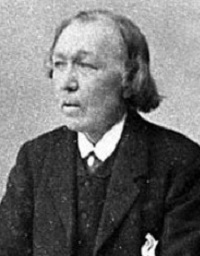 William Topaz McGonagall
William Topaz McGonagall
1825-1902
William Topaz McGonagall (March 1825-September 29, 1902) was a Scottish weaver, doggerel poet and actor. He won notoriety as an extremely bad poet who exhibited no recognition of or concern for his peers’ opinions of his work.
He wrote some 200 poems, including the infamous “Tay Bridge Disaster,” which are widely regarded as some of the worst in British history. Groups throughout Scotland engaged him to make recitations from his works; contemporary descriptions of these performances indicate that many of these listeners were appreciating McGonagall’s skill as a comic music hall character and, as such, his readings may be considered a form of performance art.
Although both born and dying in Greyfriars Parish, Edinburgh, he is almost solely linked to Dundee. He was born to Irish parents in Edinburgh. McGonagall was apprenticed as a handloom weaver in Dundee, following in his father’s footsteps.
Though he had yet to show any interest in poetry, he did display a keenness for acting; however, Mr. Giles’ Theatre, where he performed, would let him play the title role in Macbeth only if he paid for the privilege. The theatre was filled with his friends and fellow workers, anxious to see what they correctly expected to be an amusing disaster. The play should have ended with Macbeth’s death, but McGonagall believed that the actor playing Macduff was trying to upstage him and he refused to die.
He wrote his first poem, “An Address to the Rev. George Gilfillan,” displaying the hallmarks that would characterize his work. McGonagall realized that if he were to succeed as a poet, he required a patron. He wrote to Queen Victoria herself. Unsurprisingly, he received a letter of rejection, written by a royal functionary, thanking him for his interest. McGonagall took this as praise for his work.
He died penniless in 1902 and was buried in an unmarked grave in Greyfriars Kirkyard in Edinburgh.
Source: http://en.wikipedia.org/wiki/William_McGonagall
 Bibliography
Bibliography
Press your browser’s BACK button to return to the previous page.
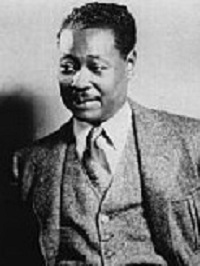 Claude McKay
Claude McKay
1889-1948
Claude McKay (September 15, 1889-May 22, 1948) was a Jamaican-American writer and poet. He was a seminal figure in the Harlem Renaissance and wrote three novels. His book of poetry, Harlem Shadows (1922), was among the first books published during the Harlem Renaissance. His book of collected poems, Selected Poems (1953), was published posthumously.
McKay was born Festus Claudius McKay in Nairne Castle near James Hill, Clarendon, Jamaica. He was the youngest child of Thomas Francis McKay and Hannah Ann Elizabeth Edwards, well-to-do peasant farmers who had enough property to qualify to vote. Thomas McKay’s father was of Ashanti descent, and Claude recounted that his father would share stories of Ashanti customs with him. McKay’s mother was of Malagasy ancestry.
At age four, McKay started basic school at the church he attended. At age seven, he was sent to live with his oldest brother, Uriah Theodore, a school teacher, to be given the best education available. While living with his brother, McKay became an avid reader of classical and British literature, as well as philosophy, science and theology. He started writing poetry at the age of 10.
In 1906, McKay became an apprentice to a carriage and cabinetmaker known as Old Brenga. He stayed in his apprenticeship for about two years. During that time, in 1907, McKay met a man named Walter Jekyll who became a mentor and an inspiration for him. He encouraged McKay to concentrate on his writing. Jekyll convinced McKay to write in his native dialect and even later set some of McKay’s verses to music. Jekyll helped McKay publish his first book of poems, Songs of Jamaica, in 1912. These were the first poems published in Jamaican Patois (a dialect of mainly English words and African structure). McKay’s next volume, Constab Ballads, came out in the same year and was based on his experience as a police officer in Jamaica.
McKay left for the U.S. in 1912 to attend Booker T. Washington’s Tuskegee Institute but did not become an American citizen until 1940. McKay was shocked by the intense racism he encountered when he arrived in Charleston, South Carolina, where many public facilities were segregated. At Kansas State, he read W.E.B. Du Bois’ Souls of Black Folk, which had a major impact on him and stirred his political involvement. But despite superior academic performance, McKay decided in 1914 he did not want to be an agronomist and moved to New York.
McKay published two poems in 1917 in Seven Arts under the Alias Eli Edwards while working as a waiter on the railways. In 1919, he met Crystal and Max Eastman, who published The Liberator (where McKay would serve as co-executive editor until 1922). It was here that he published one of his most famous poems, “If We Must Die,” during the “Red Summer,” a period of intense racial violence against black people in Anglo-American societies. This signaled the commencement of his life as a professional writer.
McKay was a substantial figure who emerged as one of the first and most militant voices of the Harlem Renaissance. He was regarded as one of the first major poets of the movement. Some of his most famous poems during that period were the militant, “If We Must Die” (1919) and his self-portrait, “Outcast,” which was collected in Harlem Shadows (1922).
In 1928, McKay published his most famous novel, Home to Harlem, which won the Harmon Gold Award for Literature. The novel, depicting street life in Harlem, would have a major impact on black intellectuals in the Caribbean, West Africa and Europe. McKay’s other novels were Banjo (1930) and Banana Bottom (1933).
McKay also authored a collection of short stories, Gingertown (1932), and two autobiographical books, A Long Way from Home (1937) and Harlem: Negro Metropolis (1940). His book of collected poems, Selected Poems (1953), and his second autobiography, My Green Hills of Jamaica (1979), were published posthumously.
McKay died from a heart attack in Chicago at the age of 59.
Source: http://en.wikipedia.org/wiki/Claude_McKay
 Bibliography
Bibliography
Press your browser’s BACK button to return to the previous page.
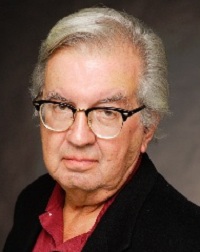 Larry McMurtry
Larry McMurtry
1936-2021
Larry Jeff McMurtry (born June 3, 1936) was an American novelist, essayist, bookseller and screenwriter whose work is predominantly set in either the old West or in contemporary Texas.
McMurtry was born in Archer City, Texas, the son of Hazel Ruth (nee McIver) and William Jefferson McMurtry, who was a rancher. He grew up on a ranch outside Archer City, Texas, which is the model for the town of Thalia that appears in much of his fiction. He earned degrees from University of North Texas (B.A., 1958) and Rice University (M.A., 1960).
McMurtry won the Jesse H. Jones Award from the Texas Institute of Letters on three occasions: in 1962, for Horseman, Pass By; in 1967, for The Last Picture Show; and in 1986, for Lonesome Dove. He also won the Amon G. Carter award for periodical prose in 1966, for “Texas: Good Times Gone or Here Again?” In 1960, McMurtry was a Wallace Stegner Fellow at Stanford University. In 1964, he was awarded a Guggenheim grant and, in the same year, he was appointed Lecturer in English at Rice University.
McMurtry was a regular contributor to The New York Review of Books and was a past president of PEN. He is perhaps best known for the film adaptations of his work, especially Hud (from the novel Horseman, Pass By), Terms of Endearment (1984) and Lonesome Dove.
In 1986, McMurtry received the Peggy V. Helmerich Distinguished Author Award. The Helmerich Award is presented annually by the Tulsa Library Trust.
In 2006, he was co-winner (with Diana Ossana) of both the Best Screenplay Golden Globe and the Academy Award for Best Adapted Screenplay for Brokeback Mountain.
McMurtry died on March 25, 2021 at his home in Archer City, Texas. He was 84 years old.
Source: http://en.wikipedia.org/wiki/Larry_McMurtry
 Bibliography
Bibliography
Press your browser’s BACK button to return to the previous page.
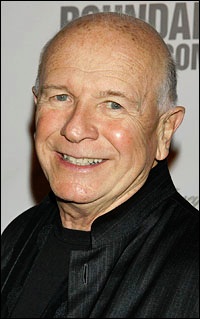 Terrence McNally
Terrence McNally
1939-2020
Terrence McNally (born November 3, 1939) was an American playwright who received four Tony Awards, an Emmy, two Guggenheim Fellowships, a Rockefeller Grant, the Lucille Lortel Award, the Hull-Warriner Award and a citation from the American Academy of Arts and Letters.
Born in St. Petersburg, Florida, and raised in Corpus Christi, Texas, McNally moved to New York City in 1956 to attend Columbia University, where he majored in English and wrote Columbia’s annual Varsity Show, graduating in 1960, the same year in which he gained membership into the Phi Beta Kappa Society. He worked briefly for the alumni magazine, Columbia College Today.
Although several early comedies such as Next in 1969 and The Ritz in 1975 won McNally critical praise, it was not until later in his career that he would become truly successful with works such as his Off-Broadway play, Frankie and Johnny in the Clair de Lune, and its screen adaptation.
His first credited Broadway musical was The Rink in 1984. In 1990, McNally won an Emmy Award for Best Writing in a Miniseries or Special for Andre’s Mother. A year later, he returned to the stage with another AIDS-related play, Lips Together, Teeth Apart.
With Kiss of the Spider Woman in 1992, McNally returned to the musical stage. Kiss of the Spider Woman won the 1993 Tony Award for Best Book of a Musical. He collaborated with Stephen Flaherty and Lynn Ahrens on Ragtime in 1997.
McNally’s other plays include: 1994’s Love! Valour! Compassion!; Master Class (1995); and Dedication, or the Stuff of Dreams.
In 1997, McNally stirred up a storm of controversy with Corpus Christi, a modern-day retelling of the story of Jesus’ birth, ministry and death in which both he and his disciples are portrayed as homosexual.
McNally’s drama, Deuce, ran on Broadway in a limited engagement in 2007 for 121 performances.
He died of complications from COVID-19 on March 24, 2020, at Sarasota Memorial Hospital in Florida.
Source: http://en.wikipedia.org/wiki/Terrence_McNally
 Bibliography
Bibliography
Press your browser’s BACK button to return to the previous page.
 D’Arcy McNickle
D’Arcy McNickle
1904-1977
William D’Arcy McNickle (January 14, 1904-October 1977) was a writer, Native American activist and anthropologist.
McNickle, an enrolled Salish Kootenai on the Flathead Indian Reservation, became one of the most prominent 20th century American Indian activists. He was born to an Irish father, William McNickle, and a one-quarter Cree Metis mother, Philomene Parenteau. He grew up on the Flathead Reservation in St. Ignatius, Montana, and went to mission and non-reservation boarding schools. In 1925, McNickle sold his land allotment on the Flathead Reservation so that he could raise the money necessary to study abroad at Oxford University and the University of Grenoble. After returning to the United States, McNickle lived in New York City until he was hired by the Bureau of Indian Affairs in 1936.
McNickle worked under Commissioner of Indian Affairs John Collier during the 1930s and 1940s. The Bureau of Indian Affairs first hired him as an administrative assistant but, by 1950, he had been appointed chief of the tribal relations branch and he soon became an expert. He was appointed the director of the University of Colorado’s American Indian Development Inc. in 1952 and received an honorary Doctor of Science degree in 1966. Later that year, he moved to what is now the University of Regina, to create the anthropology department. In 1972, he helped create the Center for the History of the American Indian in Chicago’s Newberry Library; the center was named in his honor in 1984. Also named in his honor was the library at the Salish Kootenai College on the Flathead Reservation.
McNickle was instrumental in drafting the “Declaration of Indian Purpose” for the 1961 American Indian Chicago Conference, helped found the National Congress of American Indians and was named a fellow of the American Anthropological Association.
McNickle was married three times: to Joran Jacobine Birkeland from 1926-1938; to Roma Kaye Haufman from 1939-1967; and to his AID coworker, sociologist Viola Gertrude Pfrommer, from 1969-1977. He had two daughters, Antoinette Marie Parenteau McNickle (with Joran) and Kathleen D’Arcy McNickle (with Roma). He died of a heart attack in October 1977.
Source: http://en.wikipedia.org/wiki/D%27Arcy_McNickle
 Bibliography
Bibliography
Press your browser’s BACK button to return to the previous page.
 Herman Melville
Herman Melville
1819-1891
Herman Melville was born into a socially connected New York family. To help his family cope with financial difficulties, he shipped out in 1837 as cabin boy on the St. Lawrence, a merchant ship sailing in June 1839 from New York City for Liverpool. In January 1841, he returned east and sailed on the whaler Acushnet on a voyage to the South Seas. In June of the following year, the ship anchored in the Marquesas Islands in present-day French Polynesia. Melville’s adventures here, somewhat romanticized, became the subject of his first novel, Typee (1846).
When he reached Tahiti, Melville joined a mutiny led by dissatisfied shipmates who had not been paid. The mutiny landed Melville in a Tahitian jail from which he escaped. On these events and their sequel, Melville based his second book, Omoo (1847). When Melville rejoined his family, he was encouraged to record his tales of the South Seas and began to seek out a publisher.
For more steady income, he became a regular contributor of reviews and other pieces to a literary journal. Melville also began a third book in 1847 that would become Mardi. Melville then wrote Redburn (1849) and White-Jacket (1850).
Moby Dick was finally published in London in October 1851 and a month later in America, but it brought its author neither acclaim nor reward. Increasingly a recluse to the point that some friends feared for his sanity, Melville embarked almost at once on Pierre (1852). When published, it was yet another critical and financial disaster. Only 33 years old, Melville saw his career in ruins. Near breakdown, and having to face in 1853 the disaster of a fire at his New York publishers that destroyed most of his books, Melville persevered with writing. Israel Potter was published in 1855. His contributions to Putnam’s Monthly Magazine – “Bartleby the Scrivener” (1853), “The Encantadas” (1854) and “Benito Cereno” (1855) – reflected an increasing despair and contempt for human hypocrisy and materialism.
In 1856, Melville traveled to Europe to renew his spirits. The most powerful passages of the journal he kept are in harmony with his final novel published in his lifetime, The Confidence-Man (1857), a despairing satire on an America corrupted by the shabby dreams of commerce. Three American lecture tours were followed by his final sea journey, in 1860, when he joined his brother, Thomas, captain of the clipper Meteor, for a voyage around Cape Horn. He abandoned the trip in San Francisco.
Melville left the genre of the novel in favor of poetry, but the prospects for publication were not favorable. The Civil War was much on his mind and furnished the subject of his first volume of verse, Battle-Pieces and Aspects of the War (1866). Four months after it appeared, an appointment as a customs inspector on the New York docks finally brought him a secure income.
Despite poor health, Melville began a pattern of writing during evenings, weekends and on vacations. By the time his second collection of verse, John Marr and Other Sailors, with Some Sea-Pieces, appeared in 1888, Melville had been in retirement for three years. His new leisure he devoted, as he wrote in 1889, to “certain matters as yet incomplete.” Among them was Timoleon (1891), a final verse collection. More significant was the return to prose that culminated in his last work, the novel Billy Budd, which remained unpublished until 1924. Though the manuscript ends with the date April 19, 1891 – merely five months before Melville’s death – the work had not been completely edited.
Source: http://xroads.virginia.edu/~hyper/bb/hm_bio.html
 Bibliography
Bibliography
Press your browser’s BACK button to return to the previous page.
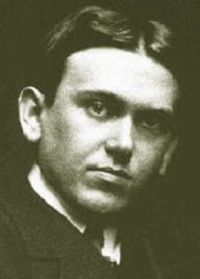 H.L. Mencken
H.L. Mencken
1880-1956
Henry Louis “H.L.” Mencken (September 12, 1880-January 29, 1956) was an American columnist, essayist, magazine editor, satirist, acerbic critic of American life and culture and a student of American English. Mencken, known as the “sage of Baltimore,” is regarded as one of the most influential American writers and prose stylists of the first half of the 20th century.
Mencken is known for writing The American Language, a multi-volume study of how the English language is spoken in the United States, and for his satirical reporting on the Scopes trial, which he named the “Monkey” trial. In addition to his literary accomplishments, Mencken was known for his controversial ideas. A critic of World War II and representative government, Mencken wrote numerous pieces about current events, literature, music, prominent politicians, pseudo-experts, temperance and uplifters. In particular, he critiqued anti-intellectualism, bigotry, hoaxes, Biblical creationism, Fundamentalist Christianity, organized religion, theism, (Mencken was a staunch atheist), osteopathy and chiropractic.
Mencken became a reporter for The Baltimore Morning Herald in 1899, then moved to The Baltimore Sun in 1906. He continued to contribute to The Sun full-time until 1948, when he ceased to write.
Mencken began writing the editorials and opinion pieces that made his name. On the side, he wrote short stories, a novel and even poetry – which he later reviled. In 1908, he became a literary critic for the magazine, The Smart Set. In 1924, he and George Jean Nathan founded and edited The American Mercury, published by Alfred A. Knopf. It soon developed a national circulation and became highly influential on college campuses across America. In 1933, Mencken resigned as editor.
On November 23, 1948, Mencken suffered a stroke that left him aware and fully conscious but nearly unable to read or write, and to speak only with some difficulty. After his stroke, Mencken enjoyed listening to European classical music and, after some recovery of his ability to speak, talking with friends, but he sometimes referred to himself in the past tense as if already dead.
Mencken died in his sleep on January 29, 1956. He was interred in Baltimore’s Loudon Park Cemetery.
Source: http://en.wikipedia.org/wiki/H._L._Mencken
 Bibliography
Bibliography
Press your browser’s BACK button to return to the previous page.
 Sam Mendes
Sam Mendes
1965-
Born Samuel Alexander Mendes on August 1, 1965, in Reading, Berkshire, England, he attended the University of Cambridge. At age 25, he directed Judi Dench in a stage production of Chekhov’s The Cherry Orchard to strong reviews. He was soon directing the Royal Shakespeare Company and working at the Royal National Theatre. Notable plays include The Sea, The Rise and Fall of Little Voice and Othello.
In 1992, Mendes was appointed artistic director of the nonprofit studio, Donmar Warehouse, in London’s West End. While there, he attracted some of the world’s finest actors to appear in Assassins, The Glass Menagerie and Habeas Corpus, among others. His dark and seedy 1998 production of Cabaret remains one of his most-acclaimed works.
In 1999, he made his feature film debut with American Beauty. The film earned Mendes a Best Director Academy Award. Other notable films include The Road to Perdition and Jarhead.
Source: https://en.wikipedia.org/wiki/Sam_Mendes
 Bibliography
Bibliography
Press your browser’s BACK button to return to the previous page.
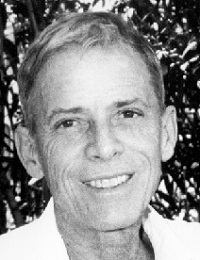 James Merrill
James Merrill
1926-1995
James Ingram Merrill (March 3, 1926-February 6, 1995) was an American poet whose awards include the Pulitzer Prize for Poetry (1977) for Divine Comedies. Although most of his published work was poetry, he also wrote essays, fiction and plays.
Merrill was born in New York City to Hellen Ingram Merrill and Charles E. Merrill, founding partner of the Merrill Lynch investment firm. As a boy, Merrill enjoyed a highly privileged upbringing in economic and educational terms. Merrill’s childhood governess taught him French and German, an experience Merrill wrote about in his 1974 poem, “Lost in Translation.” As a teenager, Merrill attended the Lawrenceville School. When he was 16 years old, his father collected his short stories and poems and published them as a surprise under the name Jim’s Book.
Merrill was drafted in 1944 into the U.S. Army and served for eight months. His studies interrupted by war and military service, Merrill returned to Amherst College in 1945 and graduated in 1947. The Black Swan, a collection of poems, was published privately in Athens, Greece, in 1946, printed in just 100 copies when Merrill was 20 years old. His first commercially published volume was First Poems, issued in 1951.
Greek themes, locales and characters occupy a prominent position in Merrill’s writing. In his 1993 memoir, A Different Person, Merrill revealed that he suffered writer’s block early in his career and sought psychiatric help to overcome its effects.
Merrill served as a Chancellor of the Academy of American Poets from 1979 until his death. While vacationing in Arizona, he died on February 6, 1995, from a heart attack related to AIDS.
Source: http://en.wikipedia.org/wiki/James_Merrill
 Bibliography
Bibliography
Press your browser’s BACK button to return to the previous page.
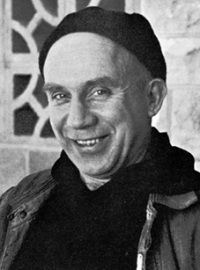 Thomas Merton
Thomas Merton
1915-1968
Thomas Merton (January 31, 1915-December 10, 1968) was an American Trappist monk and author, born in Prades in the Pyrenees-Orientales departement of France. Merton wrote more than 50 books, 2,000 poems and a countless number of essays, reviews and lectures that have been recorded and published.
Merton was educated in the United States and France before attending Oakham School in England. His father was an artist from New Zealand and his mother was from the United States. His mother died when he was six and his father when he was 16. After a disastrous first year at Cambridge University, during which time he fathered an illegitimate child, Merton moved to the United States to live with his grandparents. He proceeded to take his bachelor’s and master’s degrees at Columbia University in New York City, where he made the acquaintance of a group of artists and writers who would remain his friends for life.
Merton converted to Catholicism in his early 20s during the period when he was writing his master’s thesis on William Blake. His desire to enter the Franciscans being thwarted, he taught at St. Bonaventure’s College, in Olean, New York and, following a retreat at the Trappist (Cistercian of the Strict Observance) Abbey of Gethsemani near Bardstown, Kentucky, during Easter 1941, he came to a crisis with military call-up looming and was finally accepted as a choir novice (with the intention of becoming a priest) at Gethsemani on December 10, 1941.
During his long years at Gethsemani (where he was encouraged to write), Merton changed from the passionately inward-looking young monk of his most famous book – the autobiography, The Seven Storey Mountain – to a contemplative writer and poet who became well known for his dialogue with other faiths and his stand on nonviolence during the race riots and Vietnam War of the 1960s. He finally achieved the solitude he had long desired in a hermitage in 1965.
A new abbot allowed him the freedom to undertake a tour of Asia at the end of 1968. He died in Bangkok on December 10, 1968, having touched a badly grounded electric fan while stepping out of his bath.
Merton put a ban on publishing much of his work until 25 years after his death. After that time, his diaries were published.
Source: http://www.spiritus-temporis.com/thomas-merton/
 Bibliography
Bibliography
Press your browser’s BACK button to return to the previous page.
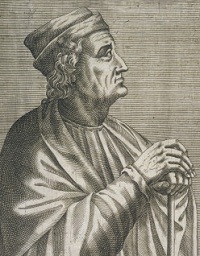 Jean de Meun
Jean de Meun
c. 1240-c. 1305
Jean de Meun (c. 1240-c. 1305) was a French author best known for his continuation of the “Roman de la Rose.”
He was born Jean Clopinel or Jean Chopinel at Meung-sur-Loire. Tradition asserts that he studied at the University of Paris. He was, like his contemporary, Rutebeuf, a defender of Guillaume de Saint-Amour and a bitter critic of the mendicant orders. Most of his life seems to have been spent in Paris, where he owned, in the Rue Saint-Jacques, a house with a tower, court and garden, which was described in 1305 as the house of the late Jean de Meung and was then bestowed by a certain Adam d’Andely on the Dominicans.
In the enumeration of his own works, he places first his continuation of the “Roman de la Rose” of Guillaume de Lorris. The date of this second part (lines 4,089-21,780) is generally fixed between 1268 and 1285 by a reference in the poem to the death of Manfred and Conradin, executed in 1268 by order of Charles of Anjou (d. 1285), who is described as the king of Sicily.
In 1284, de Meun translated the treatise, De Re Militari of Vegetius, into French as Le livre de Vegece de l’art de chevalerie. He also produced a spirited version, the first in French, of The Letters of Abelard and Heloise. A 14th century manuscript of this translation in the Bibliotheque Nationale has annotations by Petrarch. His translation of the De consolatione philosophiae of Boethius is preceded by a letter to Philip IV, in which he enumerates his earlier works, two of which are lost: De spirituelle amitie, from the De spirituals amicitia of Aelred of Rievaulx (d. 1166), and the Livre des merveilles d’Hirlande, from the Topographia Hibernica, or De Mirabilibus Hiberniae of Giraldus Cambrensis (Gerald de Barri).
His last poems are doubtless his “Testament” and “Codicille.” The “Testament” is written in quatrains in monorime, and contains advice to the different classes of the community.
Source: http://en.wikipedia.org/wiki/Jean_de_Meun
 Bibliography
Bibliography
Press your browser’s BACK button to return to the previous page.
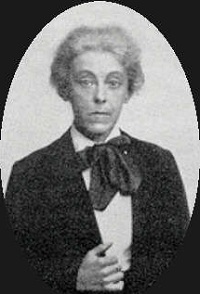 Charlotte Mew
Charlotte Mew
1869-1928
Charlotte Mary Mew (November 15, 1869-March 24, 1928) was an English poet whose work spans the cusp between Victorian poetry and Modernism.
She was born in Bloomsbury, London, the daughter of the architect Frederick Mew, who designed Hampstead Town Hall, and Anna Kendall. She attended Lucy Harrison’s School for Girls and lectures at University College London. Her father died in 1898 without making adequate provision for Charlotte, her mother and her sister, Anne.
In 1894, Mew succeeded in getting a short story into The Yellow Book but wrote very little poetry at this time. Her first collection of poetry, The Farmer’s Bride, was published in 1916. Her second collection, Saturday Market, was published in 1921.
Mew gained the patronage of several literary figures, notably Thomas Hardy, who called her the best woman poet of her day, Virginia Woolf, who said she was “very good and quite unlike anyone else,” and Siegfried Sassoon. She obtained a small Civil List pension, which helped ease her financial difficulties.
After the death of her sister from cancer in 1927, Mew descended into a deep depression and was admitted to a nursing home where, she eventually committed suicide by drinking Lysol.
Source: http://en.wikipedia.org/wiki/Charlotte_Mew
 Bibliography
Bibliography
Press your browser’s BACK button to return to the previous page.
 Stephenie Meyer
Stephenie Meyer
1973-
Stephenie Meyer (born December 24, 1973) is an American author known for her vampire romance series, Twilight.
Meyer was born in Hartford, Connecticut, to Stephen and Candy Morgan. She grew up in Phoenix, Arizona. She attended Chaparral High School in Scottsdale, Arizona, then Brigham Young University in Provo, Utah, where she received a B.A. in English in 1997. Meyer met her husband, Christiaan, when she was just 4 years old in Arizona and married him in 1994 when they both were 21.
Meyer is a member of The Church of Jesus Christ of Latter-day Saints. Meyer had never written even a short story before Twilight and had considered going to law school because she felt she had no chance of becoming a writer. Before becoming an author, Meyer’s only professional work was as a receptionist in a property company.
Meyer lives in Cave Creek, Arizona, and also owns a home on Marrowstone Island, Washington.
Source: http://en.wikipedia.org/wiki/Stephenie_Meyer
 Bibliography
Bibliography
Press your browser’s BACK button to return to the previous page.
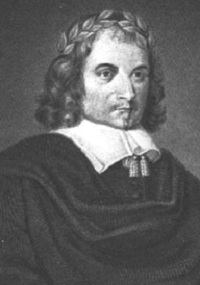 Thomas Middleton
Thomas Middleton
1580-1627
Thomas Middleton was the son of a London master bricklayer. He was educated first at Queen’s College, Oxford, and was then admitted at Gray’s Inn in 1593. He published three volumes of verse by 1600 and it is believed that he had already begun to write for the stage at that time. Certainly, he was a working playwright by 1602, when he is mentioned in Henslowe’s Diary, and his earliest surviving independent play, Blurt, Master Constable, was printed in 1602.
Middleton was an industrious, prolific writer, writing for both Boys of St. Paul’s and the Admiral’s Men. His citizen comedies, written for boys’ companies between 1602 and 1607, include A Mad World, My Masters (c. 1605), A Trick to Catch the Old One (c. 1605) and Michaelmas Term (c. 1606). He collaborated with Thomas Dekker on the comedies The Honest Whore, Part I (1604), The Family of Love (1603-1607) and The Roaring Girl (1610). For the adult companies, he wrote his masterpiece, A Chaste Maid in Cheapside (1611). These comedies expose bourgeois vice in contemporary London in a satiric tone.
From 1613 on, Middleton wrote many City of London pageants for the Lord Mayor and served as City Chronologer from 1620 until his death in 1627. He continued to write plays and three collaborations with Rowley are worth mention: A Fair Quarrel (1617), The World Tossed at Tennis (1620) and the superb tragicomedy, The Changeling (1622).
Middleton’s patriotic drama, A Game at Chess (1624), unprecedentedly successful, was closed after nine performances due to its inflammatory anti-Spanish content and the Spanish Ambassador’s outrage. The writer and the actors were reprimanded and fined. One of Middleton’s last plays, Women Beware Women (c. 1625), was a tragedy in which the final “slaughter” scene verged on comedy, a matter that has persuaded some critics that Middleton was also the author of The Revenger’s Tragedy (1607).
Middleton died of natural causes at Newington Butts and was buried there on July 4, 1627.
Source: http://www.luminarium.org/sevenlit/middleton/thomasbio.htm
 Bibliography
Bibliography
Press your browser’s BACK button to return to the previous page.
 Ben Mikaelsen
Ben Mikaelsen
1952-
Ben Mikaelsen (born December 8, 1952, in Bolivia) is a writer of children’s literature. Mikaelsen is a settler in the United States of Danish descent. He wasn’t sent to school until the fourth grade, where he was heavily bullied for his race. Some years later, Mikaelsen moved with his family to the United States, where he entered the seventh grade.
He began writing full time in 1984 and has won many awards, including the International Reading Association Award and the Western Writers’ Golden Spur award. He has also gained many state Readers Choice Awards.
He is a skydiving champion and has written many novels, such as Tree Girl, Touching Spirit Bear, Ghost of Spirit Bear and Petey.
Today, Mikaelsen lives outside Bozeman, Montana, with his wife and children.
Source: http://en.wikipedia.org/wiki/Ben_Mikaelsen
 Bibliography
Bibliography
Press your browser’s BACK button to return to the previous page.
 Josephine Miles
Josephine Miles
1911-1985
Josephine Miles (June 11, 1911-May 12, 1985) was an American poet and literary critic. She wrote more than a dozen books of poetry and several works of criticism.
Born in Chicago, she moved around a lot with her family, eventually relocating to Southern California. Due to a disabling arthritis, she was educated at home by tutors but was able to graduate from Los Angeles High School in a class that included the composer John Cage.
Miles attended the University of California, Los Angeles, where she earned a bachelor’s degree in English literature before moving to the University of California, Berkeley to pursue her doctorate. She remained in Berkeley for the rest of her life, receiving many highly coveted fellowships and awards until her death in May 1985. She was the first woman to receive tenure in the English Department at Berkeley and, at the time of her death, held the position of University Professor, one of the rarest and most prestigious honors in academic life.
Source: http://en.wikipedia.org/wiki/Josephine_Miles
 Bibliography
Bibliography
Press your browser’s BACK button to return to the previous page.
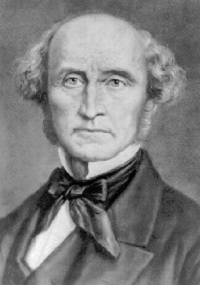 John Stuart Mill
John Stuart Mill
1806-1873
The English philosopher and economist John Stuart Mill was the most influential British thinker of the 19th century. He is known for his writings on logic and scientific method and for his many essays on social and political life.
Mill was born the oldest of nine children on May 20, 1806, in London, England, to James and Harriet Burrow Mill. His father, originally trained as a minister, had come from Scotland to take up a career as a journalist. When he was 16, Mill began a debating society of utilitarians to discuss and make popular the ideas of his father, Bentham and others. He also began to publish on various issues, writing nearly 50 articles and reviews before he was 20. But, in 1823, at his father’s insistence, Mill cast off his interest in a political career and accepted a position at East India Company, where he remained for 35 years.
The main purpose of Mill’s philosophic works was to repair the British empirical tradition extending from English philosopher John Locke (1632-1704). He overcame much of the confusion of Locke by distinguishing between the connotation, or understood meaning, of terms and the denotation, or real meaning. Mill understood logic as knowledge by inference.
Mill’s logic concludes with an analysis of the methods of the social sciences. However, the variety of conditioning factors and the lack of control and repeatability of experiments weaken the effectiveness of both the experimental method and deductive attempts. The proper method of the social sciences is a mixture: Deductions from the inferential understandings provided by both psychology and sociology.
Mill suggested that there are higher pleasures and that men should be educated to these higher dreams, for a democratic government based on agreement is only as good as the education and tolerance of its citizenry. This argument is put forth in Mill’s famous essay, “On Liberty.” Therein, the classic formula of liberalism is stated: The state exists for man and, hence, the only justifiable interference upon personal liberty is “self-protection.”
He died on May 8, 1873.
Source: http://www.notablebiographies.com/Ma-Mo/Mill-John-Stuart.html